#you cannot like a character and be able to point out their flaws? skill issue
Explore tagged Tumblr posts
Text
criticizing the mc for her treatment of those in lower positions than her does not equal hating them and has nothing to do with what you ship. thinking a girl is not allowed to have opinions opposed to yours and it all has to trace back to a man (even a fictional one) is ludicrous
#I only hate novel Athy/Lee Jihye but I don't ship anyone in the novel so the argument kinda falls apart here#I criticized manhwa Athy a few times but that does not take away from my like of her#you cannot like a character and be able to point out their flaws? skill issue#wmmap#I actually preferred it manhwa Athy ended up with no one#yes this is about this stupid ass vaguepost
6 notes
·
View notes
Text
Temple Of Menphia Lore!
SO having a character that is a follower of Menphia has resulted in me making a religion from scratch SO HERE IS THE MAIN POINTS OF THE RELIGION FOR THOSE INTERESTED! (Like most of my lore posts, feel free to use. Sharing is caring and all.)
The Temple of Menphia is a religion that focuses battle and justice, with the defining feature being the "Fury of the Righteous". I based a lot of the principles off of Sikhism and partially from the DC Amazonian's. Essentially, based it off of religious warriors. (seriously though, look up Sikhism. Super fascinating)
The temples were established by Menphia as her own way to combat shadow knights. Warriors with a strong sense of justice who are able to combat the rage of shadow knights and channel their own. It is much more difficult for a person who is in control of their emotions to be corrupted than someone dealing with religious shame. Equality and social justice are incredibly important aspects.
An important aspect of the temple of Menphia is injustice collecting. Think of them similar to bounty hunters and cops. Most temples act as a form of Judge, Jury, and Executioner, with locals coming to them with issues and the temples acting as a way to solve problems. Essentially, if a villager cannot get their lords to act on a crime, a temple priest will delegate it instead.
Temples also handle a lot of lord corruption as well. An example of this is a farmers daughter who was the mistress of a lord ending up dead. The farmer asked the temple to investigate, believing it was fowl play. One of the judges (a temple priest who is more skilled with words than battle) investigated and after finding out a Lord was he one who killed her, dispatched justice accordingly.
Unlike the Church of Irene, the Temple of Menphia is incredibly separate from politics. For they need to in order to treat everyone fairly. This also means that Temple Warrior won't join in on a war unless the know that the side they are fighting on is correct. They are for the people, not for a nation.
The temple of Menphia is very open to sex and violence. Menphia was the Divine Warrior of Fury and Passion, so as long as it can resemble a fight, you are set. It is also why tattoos are a part of the religion, it is withstanding pain and coming out on top.
Now onto some flaws about the religion. While being a very open religion, it is very difficult to join a temple. For temple members require years upon years of training, unlike the Irene church. The Temple of Irene is also a temple that isn't really that knowlegeable about science, math, or magicks. They are essentially a church of Lawyers and Warriors, they are focused on social issues and justice. They are taught to read though, but aren't taught many languages beyond Havasi (The Tu'la langauge)
A lot of Menphia followers have an extreme prejudice against shadow knights. When many of the temple warriors have been taught how to kill them since the age of 4, it leads to prejudice. The temple doesn't really do guest well either, they will nurse you back to health but claiming sanctuary isn't really a thing unless you are in genuine unfair danger.
That is all for right now. Again, feel free to use and comment or ask questions. Story building is the best when other people can chat about it.
#aphblr#aphmau#aphverse#mcd#aphmau mcd#minecraft diaries#mcd for my sunlight#divine warriors#menphia the fury#menphia
30 notes
·
View notes
Note
Is it just me or does Cass seem to be...a bit OP in every way. I get it she's ONE of the best fighters in DC, I wouldn't outright she is THE best because that way she gets no character progression in that sense where she can be officially the best fighter. But also she just seems to annoy me a little when people always say she is the best Batfam member as a whole, I love her, but I feel like bc she is such a good fighter I like that she has drawbacks with her speaking and reading.
Hi anon! Thank you for the ask, I think it's interesting what you mention, but I disagree in places I think! I think how she is portrayed in canon is not the issue, rather its fandoms habit to narrow down traits and plot progression for the sake of ease of consumption which can lead to sweeping generalisations, and how frustrating these can be to those who prefer the complexity.
Cass isn't the best fighter in the DCU, I don't think. But I'll concede for the batfam, yes she does trump Bruce for plain old hand to hand combat (note: I side with Tom King in this debate [gasp] and also put Dick above Bruce but that's a convo for another day). I do think there are smaller characters that 'rank' higher than her, I think her mother still 'officially' is placed higher than her. I don't mind so much that Cass has nowhere to go so to speak in terms of fighting skills, because I think that's kind of the point. It's her biggest attribute as a vigilante but the way she got there was so crippling that it's also her biggest hinderance as a person. Her most interesting character moments I think are the 'here's what was forcibily taken from you on the road to that top spot - is 1st place really worth that?'
I think in canon she is a very flawed individual; her social and emotional intelligence doesn't much stack up against other more balanced batfam members. Jack of all trades is master of none perhaps, but punching good isn't - snort - good enough in Gotham. The city has systemic problems that require more.
I think the fact that her very first arc kind of proves your point maybe? The fact that with the gaining of the ability to speak, zoop went her flawless fighting, and how much her entire conception of self is built around that fighting style, and why she was so frantic to get it back. She was not interested in learning who she is without the fighting, because at that point the fighting is all she was. I like that her development is learning who she is outside of that. And who she is can be... difficult.
She creeps Tim out, Steph finds her very frustrating to start with, Dick is pretty wary too. But she's just a bit of a tough nut to crack, we know she's very... nougaty under that exterior. Her stories in her solo very much reflect this I think, and her best stories were her seeing what there was outside of that violence, e.g. her experimenting and having fun with Conner (the fact it was kind of doomed to go nowhere isn't really a problem to me, it could have been anyone Cass flirted with, the point was she was trying and having fun. Relationships are supposed to be fun). Idk, the times I find Cass the most interesting is when her fighting skills have little to no part in the story. Or rather, the fighting skills are actively hindering her role in the story.
Her relationships with Babs, Tim and Steph ultimately are not really about her ability to punch really good, though it definitely plays a part at the beginning. The scene were Babs snaps at her for not being able to read in a high pressure scenario is really good because I think it shows off what kind of person Babs is under pressure versus when she's had a moment to think; how insecure Cass is in looking for approval; and also on a more meta scale how ableism isn't restricted to abled bodied persons. Babs is in a wheelchair, she aggressively and harshly puts down Cass, someone who is neurodivergent and cannot read, and she is not excused for being ableist. It was wrong, no matter how high pressure the scenario was. I dunno, that scene is really good, if only for the fact it's one of the few times where Babs is portrayed as being in the wrong, and is actually treated as such in text.
Sorry, I've gone on a tangent here. I guess when it comes to fanon interpretations - is Cass the best because she can punch good? Is that what qualifies her to be the best Bat successor? I'd say not. Is it because she's the only one who actively wants it? Again, I'd say not. Wanting something doesn't mean you should get it, but I know I am in the minority here for that.
Thoughts thoughts... Thank you for sharing anon!
86 notes
·
View notes
Text
So.. I'm just gonna write this out because I'm having a difficult time conceptualizing how I feel about the hints pointing towards why people think Vyn is so suspicious.
Let's first address the ominous way he was introduced. My brain isn't working right now so I think I'm going to just quickly short cut to what that was. I'm pretty sure it was just referring to the hints that get thrown around that MC/Rosa should be exposed to the truth and be able to experience things herself, despite how Artem seems to want to shelter and protect her from that. It, at least, is the context I've gathered thus far.
But, Vyn is a hypocrite and I like that it's super apparent that he has that flaw. Despite wanting her to be exposed to the truth, he is also obsessed with keeping her safe from harm as well. Perhaps because he fell for her shortly after actually meeting her.
Also, he's constantly on about how people should just be upfront and express themselves, but he cannot seem to do that very thing when it comes to expressing his own feelings for her and what he's feeling or wants. From that, I can probably deduce that he comes from an overbearing parentage, as those sorts tend to tell you what you need to want instead of properly teaching you from a young age how to express your desires and realize you have desires at all. This deduction is backed up by the horse side story where it is hinted that Vyn comes from high society, having overbearing parents that require a "stiff upper lip" and for you to bottle everything up is very common is said households.
Taking that info, we go onto what people have been calling the red flag, "false tears".
Not gonna lie, I am truly, admittedly mixed on that as well, since I've actually read through all of his side stories except for the mideaval one and the rest of the one with the magician, and I thiiink one other.
See the issue is -spoiler- he was distraught about a patient under his care that attempted to commit suicide, and ended up paralyzed (it's a bit contradicted in text whether it was para or quadriplegic). The thing is, he was distraught and truly hurting over it, but he made it appear he was hurting more than he actually was to seek comfort from MC. Now, whether that is unforgivably condemnable, I'd say is up to the individual, but I honestly wouldn't put it passed anyone to have done something like this out of weakness. You can tell in his later self-analysis that he seems surprised and probably regretful for letting himself lose face for that moment, but at the same time, it's healthy to express your desires, even if in small ways like this that are unlike him to do.
The thing that Vyn has managed to make harder for himself is setting other's expectations of himself too high, making it easy to forget that he is a person capable of fault and even falling into accidental manipulation tactics. I mean, I know it seems scarier because he is a psychiatrist and knows how manipulation works and like he could easily use that knowledge and stoicism against people, but I'm certain that he is truly a genuine person who means well with each action he takes.
If anyone takes the time to read the side stories, when he's alone, you can see how soft and smitten he is for MC, he's an idealistic romantic at his core. I truly believe that and I think he truly cares about helping people or he wouldn't do for them what he does. He is absolutely at her mercy, if she wanted that.
As for the jealousy thing, yeah, that can be a problem, but again. Reading into the context of what we've been given, you can see he's probably very deeply insecure, which is why he's so anal and a perfectionist, and never wants anyone(especially MC) to see that he is capable of making mistakes, and needing help, or that he might look uncool or unknowing at any situation.
He's also pretty naïve and lacks "common sense" or social skills in some situations, but that's... I digress. Haha. Let's just say, that's pretty common with highly intelligent people. So is nearsightedness as it so happens. I can kinda see where his grace with interactions was a learned trait and he seems to also be a perfectionist with keeping that up as well.
I'm thinking these will be subjects of interests for his own character arc(s).
I'm a psychology enthusiast, myself, and I love character analysis, so, so.... Keeheehee. I'm thinking I'll pull screens later, but there are a lot and I'll probably emphasize more on the points either in an edit or a future post, but for now, I kinda just wanted to tidy up my disorganized thoughts into a more coherent post not only for anyone interested in my two cents, but for my self as well. orz
136 notes
·
View notes
Text
BL Round-Up #3
I think this is #3? I only found post #2 on a quick search, but I want to start numbering these in case I refer back to them at some point. I appreciate all of you who read over my musings.
Right now I’m absolutely obsessed with Minato’s Laundromat and Gameboys 2. However, I’m having a great deal of fun with the BL I’m choosing to watch. I have never been able to read yaoi consistently due to access issues (I read a good amount of English-language m/m romance though), but I’ve been with Thai BL since Love of Siam, SOTUS, Make It Right, and Lovesick (in that order).
I don’t have great points to make, but I need to gush so that I can focus.
Let’s go through my shows in order of current rating.
Minato Shouji Coin Laundry aka Minato’s Laundromat (GagaOOlala) 10 - I’ve mentioned repeatedly that I’m enjoying the way this show handles the age gaps between the characters. Yesterday, @liyazaki created a wonderful set comparing the show to the source manga that I spent almost half an hour appreciating by reading the original manga. I’m particularly impressed with Nishigaki Sho’s ability to present Shin’s constantly shifting emotions as well as his ability to deliver incredibly forthright dialogue earnestly and believably. It contrasts well with Kusakawa Takuya’s more considered performance as Minato.
This latest episode (#5) revealed that Minato’s memory and mental image of Sakuma may be flawed because of the way he idolized him. When we see Minato remember Sakuma, he seems poised and mature. However, we see that Sakuma is kind of a goofball and a klutz. I was not expecting an unreliable narrator perspective in this show.
I was also excited for Akusa to have a brewing dynamic with an older character as well. I think it’s really useful to tackle age gap romance from multiple perspectives, so I”m glad we’ll see this from another m/m pairing, as well as from a young woman pining for her male teacher.
I find myself thinking about this show a lot between episodes, and I think it’s the first show in a while that I am uncertain how I want to end. I think a separation will be required, but I don’t know that I want to see multiple years pass in a final shot that ends with the leads meeting again and giving each other ambiguous smiles. I will lower my rating dramatically if that happens.
Gameboys 2 (GagaOOlala via VPN) 9.5 - I consistently find the Western-influenced experience with queerness particularly endearing with content from the Philippines, and that continues into episode 3 with Cairo dealing with jealousy between Gavreel and Terrence. I don’t think Terrence intends harm, and wants to do right by Gav and Cai, but he unfortunately cannot because of the history.
Terrence is Gav’s ex from before COVID. He and Gav have a rapport they fell back into quickly, and Cairo’s jealousy of that is understandable. Moreover, Terrence shares a love of exercise and cooking (and a general competency with house chores) that Gav doesn’t have. It’s unfortunate, because one of Gav’s love languages is acts of service. He likes to take care of Cairo, but it unfortunately makes Cairo feel like he can’t reciprocate in kind. I’m glad he recognized it in himself and was able to vocalize it.
I probably mentioned this last time, but I really like this as a bit of drama. It feels like the kind of problems queer friend groups run into. That the group is incestuous causes all sorts of jealousy, and I’m glad Wesley, Pearl, and Achilles are showing up now. Everyone in this group has had some form of feelings for other members of the group, and that is not something we often see represented in BL.
I think it’s a lot of fun seeing the cast outside of screenlife full time, and I’m glad the IdeaFirst Company gets to show off their production skills. However, Bestie and I did note that there are a few errors involving food, clocks, and light in the show. There’s a whole scene where Cairo’s plate changes capacity in every cut that stood out in particular.
Senpai, This Can’t Be Love! (Gaga or Viki) 8.5 - I continue to enjoy the workplace romance here. I like that both of them clearly like each other, but are struggling with perhaps a seniority issue and a hero worship barrier. I’m looking forward to the final two episodes to see when they’ll deal with the clear attraction between them.
Vice Versa (GMMTV YouTube) 8.5 - I am actually finding Jimmy charming in this. I think the biggest thing I’m experiencing with this show is a strangeness about a BL using traditional queer elements. They’re in an alternate world where gay marriage is legal and celebrated, so there’s no problem with Tess and Tun liking each other or being together. However, Talay and Puen are running their bodies and hiding their real identities from the people in their current lives. They also gather with other like-minded people in secret. It’s an unexpected dichotomy that I hope folks with a better grasp of the language of queer theory tackle later. For now, I remain intrigued by the show, and now demand Milk Pansa and Love Pattranite get their own show.
Coffee Melody (Viki) 8.5 - This show is honestly a nice palate cleanser in everything airing right now. It’s not too complicated, and everyone’s feelings are earnest and easy to follow. I will report back more later, but I will say that it’s very watchable in a way that other shows from Thailand have not been of late.
Love Mechanics (WeTV) 8 - I had my doubts about the value of taking EN of Love: Love Mechanics and stretching it out for 10 episodes like this, but I really enjoyed seeing Mark and Gun talk about their romantic woes together. I also think Yin has gotten much better and makes Vee a much more empathetic character. He’s a difficult character to like, and I do feel for Mark in this regard. I suspect much of it has to do with his sense of inadequacy about wealth and class, as well as his dad’s homophobia. I’ll stick through with this show because I’m enjoying the performances.
Not BL
Extraordinary Attorney Woo (Netflix) 10 - This show is really fantastic. I get why people love Kdrama so much. It may be a bit long, but the pacing is so much more even than most American programming. Every moment in the show feels useful and intentional, and I’m having a good time.
Move to Heaven (Netflix) 9 - Finished this last night. I enjoyed it, though I struggled with the uncle character the whole time. This show was incredibly melancholy, and I’ll need to spend more time reflecting on it.
#what I'm watching#minato's laundromat#minato shouji coin laundry#gameboys 2#vice versa#love mechanics#extraordinary attorney woo#senpai danjite koidewa!#senpai this can't be love!#coffee melody#move to heaven
11 notes
·
View notes
Text
The Witcher: The Games vs the Books part 2 – Characters and Accents
So, I've already talked at length about the relationship between the Witcher books and games, but how well they captured individual characters is its whole own subject – and you’d better believe I have enough thoughts on it for a whole extra post.
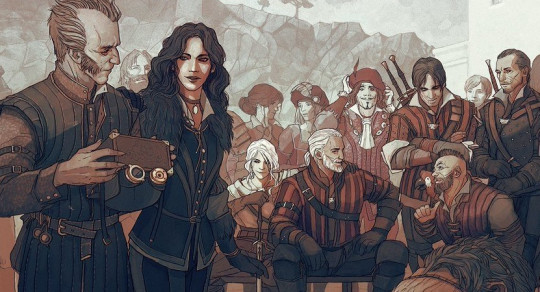
Andrej Sapkowski's skill for creating vivid and engaging characters really is so much of what brings the books to life, and no matter how much work an adaptation might put into worldbuilding and plot, it's the characters you've really got to nail to get the long-time fans on board. Especially when you’ve done what the games have, framing themselves as a direct continuation of Sapkowski's story. Nothing invites comparison to your source material like basically forcing fans to read the original novels to understand even half the backstory alluded to in-game.
So how did they do? I can only offer my opinion – characterisation is necessarily going to be a lot more subjective than just telling you what plot points the games contradicted outright – but like any fan, I have opinions in plenty.
Of the main cast, I feel Yennefer is the character they've captured the best. They've done just as well with some supporting players – I have no real complaints about Dijkstra or Phillipa, for example, who are favourites of mine in both games and books. For the main players though, Geralt and Regis seem to be the ones who's differences I'm most inclined to forgive, whereas I don't feel like they've done Ciri justice at all. Book!Geralt is much less of a smartarse, for one thing, whereas Book!Ciri is much more of one. But if we're talking about the differences, I’m afraid we really need to start with Dandelion.
Dandelion
For all the genuinely good work the games do with characters, old and new, I don't think I can overstate what a disservice the they've done Dandelion, who I could not stand in TW3, but is now one of my favourite book!verse characters. Alas, Dandelion is a prime example of something the Witcher games really don't do well: camp. Being the archtypical bard, Dandelion is about as flamboyant as any enthusiastically-heterosexual man can be: you should be able to spot this guy by body language alone, he should be flouncing around and he should talk like a spoiled noble auditioning for Shakespeare. Book!Dandelion is over-the-top and ridiculous and just so much fun, and I loved him well before I'd even really gotten into the rest of the books around him.
Here's just a bit of dialogue from one of his first appearances, to give you a sense of how he and Geralt play off each other.
The bard seized the fingerboard of his lute and plucked the strings vigorously. ‘How would you prefer it, in verse or in normal speech?’ ‘Normal speech.’ ‘As you please,’ Dandelion said, not putting his lute down. ‘Listen then, noble gentlemen, to what occurred a week ago ��near the free town of Barefield. ‘Twas thus, that at the crack of dawn, when the rising sun had barely tinged pink the shrouds of mist hanging pendent above the meadows—’ ‘It was supposed to be normal speech,’ Geralt reminded him. ‘Isn’t it? Very well, very well. I understand. Concise, without metaphors. A dragon alighted on the pastures outside Barefield.’
Though TW3's Dandelion certainly looks the part, you have to go hunting through art from the Gwent cards to find much that comes close to really capturing his personality (see left pic below – though even there, a Dandelion who'd voluntarily break his treasured lute is a very hard sell). Though a lot of fanart does better (right-below – credit goes to Tatiana Ortaliz).
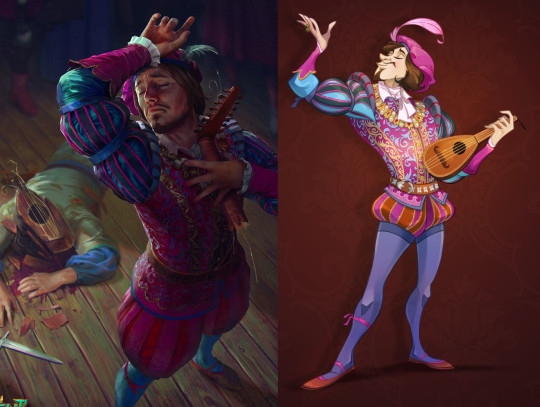
But as poorly as the games capture his flamboyance, they're not that much better when it comes to taking him seriously. TW3 left me thinking he was all talk and no substance; the books make abundantly clear that he really is renowned enough to be welcome in courts across the continent. Though he often overestimates what he can talk himself out of, he isn’t stupid either: he's lectured at Oxenfurt, spied for Dijkstra, and then there are the moments where the frivolous playboy mask slips and you realise he's sometimes much better at understanding people and relationships than Geralt will ever be (which is honestly kind of funny considering how many of Dandelion’s relationships end with plates being thrown at him from an upper story). He's not at all above mocking Geralt when he deserves it either (and especially his personal and relationship issues) – Geralt will happily mock him right back.
We never do learn how they became friends (I'm pretty sure the incident listed in the wiki is just the date of their first expedition together, not their first meeting), but Geralt just doesn't form lasting friendships or romances with anyone he can't have an intelligent conversation with. And Dandelion is a damn good friend to Geralt – one who, despite being a helpless, squishy little bard, will keep Geralt's secrets under torture, or will follow him into Nilfgaard in the middle of a war simply because you don't let a friend make a trip like that alone. (Seriously, I don’t ship it nearly as much as some, but hot damn there is some material in here if you do.) In short, it's basically inconceivable that he'd leave an amnesic Geralt wandering around Vizima alone, as he does in the first Witcher game – which is the kind of thing I can mostly forgive as a gameplay conceit, only it doesn’t really get better from there.
He’s also supposed to be blond, something I don’t think is technically specified until fairly late in the novels, but 100% what I’d been picturing since his first description as a man in a colourful bonnet with cornflower-blue eyes (let’s face it: Dandelion’s hair isn’t the only thing about him that screams ‘blond’). It’s a shame no-one from the games to the show to the novels’ cover artists seem to have noticed – but at least there are some fanartists out there who were paying attention (credit for these goes to Asphaloth, Ghostcupdraws, Hvit-ravn (tumblr deleted), 94355 and itsmespicaa).
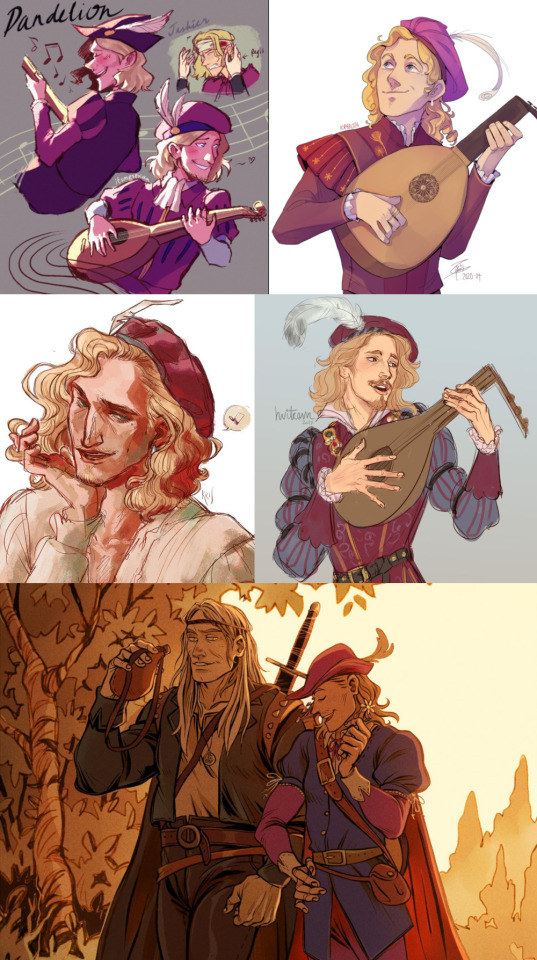
As for the games? Well, I cannot speak to how Dandelion came across in the original Polish, but I think it speaks worlds about the priorities of the English version that they didn’t even bother to cast someone with a halfway-decent singing voice as their master bard. There are isolated moments of dialogue that come close to sounding like book!Dandelion– mostly in Witcher 2, which comes closer to capturing the spirit of the books than either 1 or 3, or his attempts to convince his captor he's a disguised noble when you rescue him TW3 – but his voice actor is just painfully ill-suited to the role.
Geralt
Geralt fares much better than Dandelion, though he’s still a little hard to square with the Geralt of the books. Book!Geralt spends a lot more time sulking, just to begin with: he sulks because his job is complicated and gets him no respect, and because the world is unjust and unfair – and, most of all, he sulks because Yennefer has dumped him again. He also gets mocked for sulking, and usually deserves it. Book!Geralt is generally a lot more taciturn and a less prone to making smart comments just to have something to say – arguably because in book!Geralt's world, making smart comments often ends at the gallows, or at least with some corrupt official making your life much harder. Book!Geralt's world kind of sucks, and he's just got to put up with it.
As much as he often plays into the expectations of being an uneducated monster hunter, he's also got a more of an intellectual streak than you’d guess. He may prefer to stay out of politics (because damnit, his job is to save people from monsters, not people who are monsters), but he attended school at Nenneke's temple and has even taken classes at Oxenfurt academy, and there's a lot of thoughtful nuance to his opinions – his speech to Ciri about why he can't in good conscience take a stronger stance against the Scoiata'el contains a wealth of historical perspective, just for one example. Even his smart comments tend to be, well, somewhat smarter in the books.
Book!Geralt’s explicitly a lot younger than Yennefer – around 50 is the usual estimate, falling far short of the 100-ish the games suggest (the scandal of having a man fall for – gasp! – an older woman clearly didn’t bother Sapkowski one bit). You don’t see nearly as much "I'm getting too old for this" from book!Geralt, who's really not that old by witcher standards, and is apparently still hunting monsters long into his future. I'm also a little annoyed by the way they play off his hatred of portals like he's a grumpy old man who doesn't like mobile phones, when his distrust originally came from having seen the gruesome deaths that result when portals go wrong. This is not to say Book!Geralt lacks other ordinary human flaws, however – twice in the last two books of the main saga, he gets severely sidetracked after his ego gets the better of him (in the adulation he receives after being knighted, then after arriving in Toussaint), and it's quite some time before he properly gets back on track for that whole rescuing-Ciri thing again. He’s also pretty hopeless when it comes to romance and relationships – breaking things off gracefully is really not in his skillset.
So why does game!Geralt not bother me more? Well, he's the main player character of a game franchise, and one who has to carry the experience largely solo. Some adjustments for genre are pretty much inevitable in that position. He's certainly fared better than Meve, for example, who's been softened far more from her book characterisation for her PC role in Thronebreaker. Then there's the whole amnesia thing – it's easy to believe that sort of experience would change a man – and if he doesn't sulk so much as he used to, maybe he's grown up a bit. Geralt's also in many ways the straight-man of Sapkowski's Witcher universe – there largely as the reliable centre for other, louder personalities to play off. But I expect the real bottom line here is that I do still like game!Geralt enough to forgive him a lot of what he lacks.
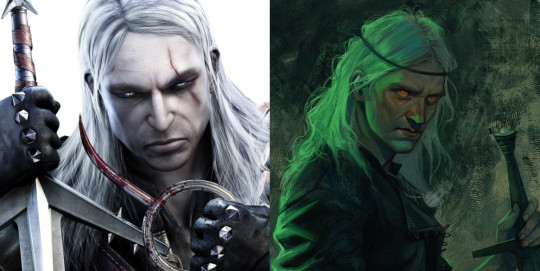
The books never do describe Geralt as being very attractive – something book-based fanart often tries to reflect. The point has been made before that the rather-alien-looking Geralt of the first game (left pic above) is probably a lot closer to his book-description. However, the main distinguishing factor you’ll see in book-based fanart is probably the ubiquitous headband, which genuinely is what book!Geralt wears to make his hair behave (the example on the right above comes from Diana Novich).
All that said, if Sapkowski really wants me to believe that nearly so many women are eager to jump into bed with him, I’m going to have to shallowly assume our witnesses are unreliable on this front, and Geralt is at least as attractive as Witcher 3′s take on him. Nothing else makes sense. *g*
Regis
Regis varies mostly in that book!Regis is a lot more smug, sometimes verging on obnoxious – and a lot keener to make fun of Geralt (who generally deserves it). But then, Regis is old and wise and superpowered enough to dance rings around most everyone else – can you blame him? By Blood and Wine, Regis' overconfidence has been recently smacked down hard after his near-death-experience at the hands of Vilgefortz, and that kind of thing could knock some chips off anyone's shoulder. Throw in the fact that with Dettlaff, we have a situation not even Regis could make light of, and the changes to game!Regis make a certain amount of sense.
I do feel it's a bit of a shame that the vocal direction didn't work just a little bit harder to capture some of Regis' smugger side, or emphasise that his long-winded philosophising on human behaviour is supposed to sound a bit pretentious. This is actually something I suspect they were going for a few times in the script, but which didn't come through in the dialogue quite the way it was meant to. Still, again, I'm sure I'm biased by the fact that I like game!Regis far too much to find much fault in what they've done with him. They've done a lovely job capturing his friendship with Geralt too.
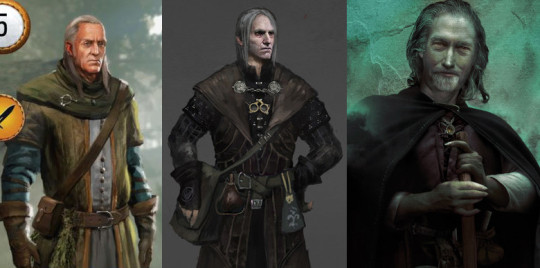
Looks-wise, there's a tendency in book-based art to portray Regis with long hair (even some pre-Blood-and-Wine Gwent art did so – see the two pics on the left above, from Gwent and early B&W concepts. The right-most pic is cover art from the books). I couldn't rightly tell you where long-haired-Regis comes from, though – perhaps it's described more explicitly in the original Polish, or perhaps it comes up in passing in some passage I've forgotten, though it may just as well just be a fannish meme.
The books do describe him as looking rather like a tax collector, slim, middle-aged, with an aquiline nose, prone to wearing black, and his hair as 'greying' or 'grey streaked', so presumably somewhat younger-looking than the game would have it. The hammer-horror-esque sideburns are likewise a game-verse addition, though I do like the look they went with – it's distinct from Geralt in a way that making him another long-grey-haired man wouldn't have been, and that's probably the point.
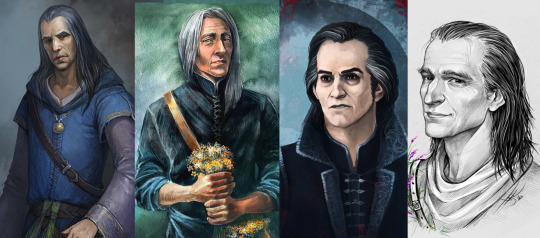
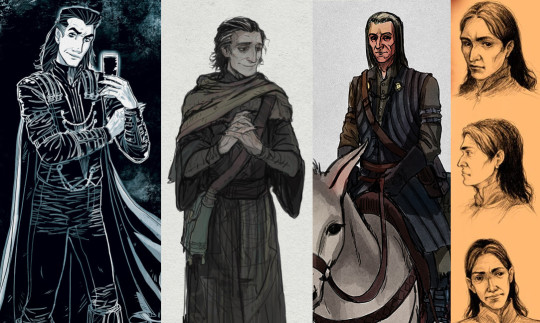
Being the hopeless Regis fan I am, I have quite the folder full of different fanart takes on book!Regis, so have a selection – art here is by gellihana-art, justanor, greysmartwolf, Nastyaskaya, NatalyLanier, beidak, natalliel, ellaine and afternoon63. For what it’s worth, I feel beidak’s (bottom pic, second from the left) comes the closest to what I’d have pictured personally, based on how he’s first described.
Ciri
I find it much harder to rationalise the changes to game!Ciri, who I didn't exactly dislike, but found stuck too close to the role of generic-macguffin-girl-who-just-wants-to-be-normal to be very interesting. Having read the books, not only do I much prefer book!Ciri, I'm not sure I can emphasize enough how much the game did NOT prepare me for utter gauntlet of whump and misery that girl survives in the last four titles. Book!Ciri is a character who works for me mostly because of the same flaws the game mostly strips her free of – TW3 makes some token noise about how you can't tell her what to do, but she’s an utter little royal brat when we first meet book!Ciri, and it’s so much of what brings her to life. She throws herself into her witcher training with the enthusiasm of a kid going completely native, but still revels in getting to be girly for a change when Triss first arrives at Kaer Morhen. She hates Yennefer at first, but soon bonds with her just as strongly as she ever did with Geralt, picking up some of Yennfer’s haughty mannerisms along the way. And then she gets thrown through a portal and lost in the distant wilderness, and the whole world comes down on her head.
The build up to the first time Ciri actually has to kill someone is intense... and things only get worse from there. Steadily. For another couple of novels at a stretch. Seriously, a major caveat that pretty much has to go into any rec for these books (and I will absolutely rec these books) is that Ciri's story gets heavy. So heavy one finds oneself using phrases like, "that time that one guy died of his wounds on top of her while semi-consensually feeling her up was honestly one of the less traumatic incidents in the period."
By the end of the novels, Ciri has nearly died of thirst, been beaten, tied up, dragged around the country as a prisoner, run with bandits and killed innocent people for the fun of it, done fantasy-cocaine and got a tattoo, fought off more than one attempted rape, been drugged, lain for multiple nights next to an impotent elf who completely fails to impregnate her, watched the bodies of her friends and girlfriend being mutilated in front of her, and did I mention where she got that scar? She has survived hell, and it is absolutely a testament to her own strength that she somehow comes through it and puts herself back together at the end. When Geralt finally arrives to rescue her, what matters most isn't that her ordeal is over, but that she finally knows she hasn’t been abandoned by everyone who’d ever loved her after all.
The Ciri of the books is fierce and wild and arrogant, but she's learned her morals from the best, and she holds onto them until she can't, then picks them back up again when she can, and above all she survives. For all that her story turns arguably too much of the last two books into a slog of misery, oh boy does it pay off at the end. And that's probably about as much as I can say about her Big Moment in the last book without spoiling too much, so suffice to say that by the end of the saga, Geralt has pretty much become a supporting character in Ciri's story, not the other way around. (Seriously, you’d be surprised how few chapters of the last two books he’s actually in.)
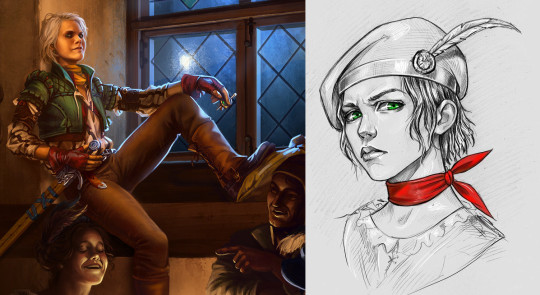
Finding art which captures the aspects of Ciri’s character and history which are missing from the game has turned out to be pretty hard, though the fanart above from her bandit phase takes a decent crack at it (credit to Loles Romero and NastyaSkaya). I do rather like that one shot of her on horseback beside her girlfriend too, which comes from Denis Gordeev’s illustrations for the novels (below).
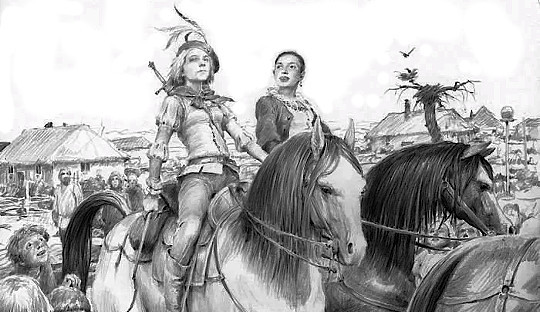
How much of this does TW3 get across with her portrayal in the game? Well, she's still pretty headstrong, I guess. And they let you give a 'sorry, I like girls' answer in one bit of dialogue, so they remembered her girlfriend existed. That's nice. But game!Ciri still has a kind of wide-eyed innocence that book!Ciri lost years ago, while book!Ciri is a little force of nature in ways the games hardly even hint at, and that's a really shameful loss.
You'd think, with a character so young, it ought to be easier to imagine she's simply grown up since we saw her last, but so much of what's changed about Ciri feels like a step back rather than forwards. I can shrug off Geralt and Regis' differences and still enjoy their game-verse-selves, but Ciri leaves me genuinely disappointed.
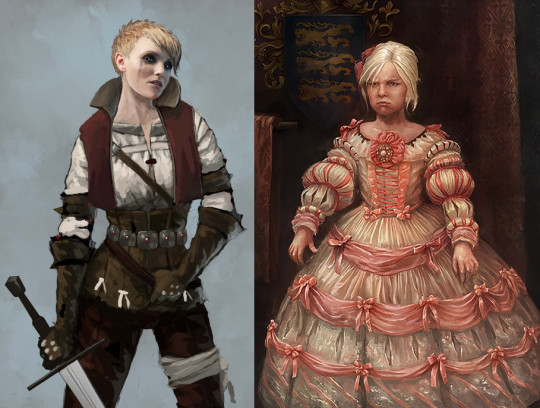
I’d say the official art that comes closest to capturing book!Ciri is that one portrait of her as a very grumpy young child (right above). Some of the early concept art (left above) feels a little more like it has her attitude, though she’s rather too yellow-blonde – not to mention too pretty. I think it also bears pointing out that Ciri isn’t really supposed to be the kind of beauty she is in the game – even before she gets what’s meant to be a seriously ugly and disfiguring scar. (Fanart below by justanor and bobolip)
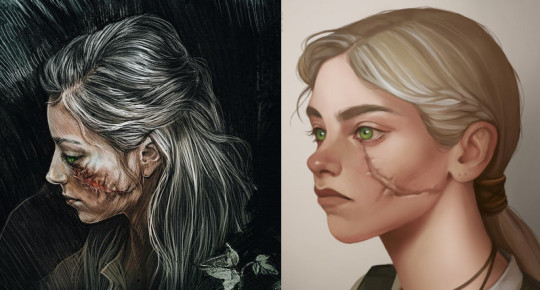
But of course, the male gamer fanbase can’t be expected to give a fuck about a girl they wouldn’t want to fuck, so game!Ciri must be generically gorgeous. Le sigh.
Triss
I suppose I should at least touch on Triss, too, though she's a very odd case. She's so out of character in the first Witcher game that I am wryly amused that the biggest thing they arguably do get right is that taking advantage of Geralt the moment he showed up with amnesia is... pretty well in-character for her (look, I gotta be honest here, I'm not much of a fan of Triss in any of her incarnations).
The second game does a much better job with her – she actually feels like book!Triss, she has some good dialogue, we're finally dealing with some of her conflicted loyalties to the Lodge and to Geralt – though by the third, her characterisation has been so softened into “the nice one” that none of that potentially meaty conflict is ever resolved, or even really mentioned. Perhaps there's more buried in the Triss-romance path, which I've never bothered with, but the writers seem to have just given up on dealing with anything that might make her look less than wholly sympathetic. Heck, we hardly even get a clear statement about why she and Geralt broke up between Witchers 2 and 3.
Even speaking as such a not-a-fan of Triss, I promise there is more they could've done with the character the books give us. There's her ongoing trauma in from the Battle of Sodden, where she was injured so badly she was memorialised as one the dead: the 14th of the hill. There's her furious impatience with the neutrality of both the witchers and the Lodge: Triss has fought and died for a cause, and is ready to do so again. The second game sort of gets into this, but by and large, the games really aren't up to tackling the moral complexity of having such a theoretically-sympathetic character as Triss, who was still broadly willing to go along with the Lodge's plans to pair Ciri off and get her pregnant as soon as possible – her own wishes be damned. No, instead, Triss has conveniently left the Lodge before the rest of them go spiraling into abject villainy in the second game, clearing all that messy grey stuff out of the conflict.
Of course, the really big unresolved plot point still hanging over book!Triss is how badly she needs to terms with the fact Geralt's just Not That Into Her, and never has been – but since the games want Triss to be a serious romantic option, that's definitely not getting the resolution it could've used.
Book!Triss also pointedly avoids any outfit with a plunging neckline because her chest is covered with the ugly scars she received in the Battle of Sodden, something the games did not have the guts to reproduce. In a more confusing note, the books do consistently describe her hair as 'chestnut', which we'd usually think of as meaning 'brown' – though it turns out the games actually may not have been wrong to make her a redhead, since in Poland 'chestnut hair' apparently mean dark red hair (google some pictures of actual chestnuts, and you'll see why). Still, the firy-red-haired Triss of TW3 who wears nothing but plunging necklines remains a bit of a stretch, however you slice it. Once again, TW2 gets her best (and I must say, gave her the nicest outfit) – though even here she's conspicuously unscarred in all her sex scenes.
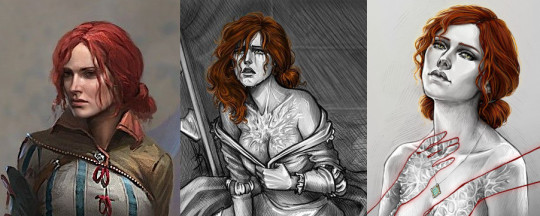
(Leftmost pic above is official Witcher 2 art, whereas Triss-with-scars fanart comes to us – once again – from nastyaskaya)
Shani
Shani sort of falls into a similar category as Triss as someone who isn't terribly well-served by any of her appearances, given that both exist in the first game largely to compete for Geralt's attentions. But I can't honestly say I find Shani’s portrayal in the Hearts of Stone expansion to be much better – the degree to which either version exists solely to fall all over Geralt is a bit painful, especially given that their relationship in the books is limited to a single, undramatic hook-up. Book!Shani really only appears in a couple of chapters: we meet her as a medical student friend of Dandelion's, who's been surreptitiously selling pilfered university supplies to fund her degree, then later see her again in the final book, where she proves herself as a battlefield medic during the climactic Battle of Brenna. She's pragmatic to a fault, and I really can't see her as the type who needs Geralt to point out to her that her patient is dead, for example, or who'd subject a guy with Geralt's problems to such an extended feelings-dump as you'll get out of her during the wedding.
Shani is a reasonably logical book-character to bring back, if only because she’s one of those who explicitly survives the ending, but for my money, "serious contender for Geralt's affections" is just not a role she works in.
Anna Henrietta
The duchess of Toussaint, Anna Henrietta, is another case who differs more from her book counterpart than you might think. In the books, the duchess is by far the least competent of the (pleasantly many and) various female leaders and rulers we meet – she comes across as rather young and naive, and every bit as absurd as everyone else in the ridiculous fairy-tale duchy she rules. She is, for example, most displeased to learn that Nilfgaard's war against the north is ongoing (something her courtiers have carefully avoided mentioning in her presence), because she'd long since sent the Emperor a stern note demanding he brought it to an end. She promptly has one of her ministers sent to the tower for misinforming her, and demands the others prepare an even sterner note for the emperor, which will surely do the job.
After Dandelion (inevitably) cheats on her, she has him repeatedly sent to the gallows, only to change her mind and send him a reprieve at the very last minute each time. Picture yourself a much younger and prettier version of the Queen of Hearts from Alice in Wonderland, and you've about got her general vibe.
Blood and Wine sort of waves at this part of her character when she first speaks about Dandelion, and again in suggesting there's a widespread feeling she lacks compassion, and once more as she proves utterly immovable on the subject of her sister. But the generally sensible and insightful woman you deal with for most of the main story is a far cry from her book-verse characterisation. That’s a bit of a shame, because I feel like there's a lot more they could have done to blend the two versions of her. Still, it’s hard to argue the duchess we get suits the story being told around her.
Other characters
Much as I love Yennefer, Dijkstra and Phillipa, I don't really have much more to say about them because I feel the games have done such a good job. The Yennefer of the books gets to show a lot more depth and complexity simply because she has more scenes and more space in which to do so, but when ‘there isn’t more of her’ is your biggest complaint, the game is officially doing pretty well. I could certainly gripe her about how “dresses in black and white” seems to have been taken as “dresses in black with maybe a trace of white trim”, or how Yennefer and Triss seem to be the only sorceresses in the world capable of wearing pants, when Phillipa (just for one) is in sensible men’s clothing the very first time we meet her, but that’s getting into serious nitpicking territory.
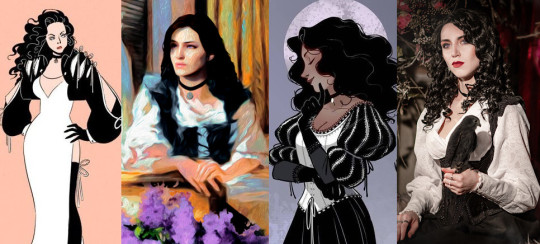
(Not that Yen can’t look amazing in outfits with more white – art by Emily Caroll, theclashofqueens, BarbaraRosiak, and cosplay by greatqueenlina)
Vesimir, Lambert and Eskel, Geralt's fellow witchers from the School of the Wolf, fall into a similar category for me – though we spend far less time with them in the books, everything we see of them in the games feels like a fairly logical extension of their book-roles. Vesimir is somewhat over-played as the old fogey, and his death is painfully cliched, but the impact on the characters and Kaer Morhen still hits home – and the games do some especially great work expanding Lambert into a much more complex character. To my mind, the only shame is that more of the book-original characters didn't get the same treatment.
Who have I missed? There's Avallac'h, of course, but I think I've got him pretty well covered by that last post. Zoltan, perhaps inevitably, has had his personality largely flattened into 'generic dwarf', with nothing better to do than hang around Geralt and Dandelion. You wouldn't know Book!Zoltan was apparently incapable of turning away women and children in need, for example – even human women and children with the chronic inability to say thankyou for his help. Or that he eventually admits to Geralt that the luggage he and his friends are carrying comes from a decidedly unsavoury source for such a supposedly charitable, upstanding guy. Yes, even Zoltan gets to be a morally complicated character in the books – who knew?
Speaking of dwarves, pleased as I am that Yarpen Zigren gets remembered in TW2, he's an odd one to talk about, since even in the books, he appears to have had a substantial personality transplant between his two main appearances. Yarpen’s a largely comedic figure in The Bounds of Reason short story, where he cheerfully admits to having considered letting his men knock down a particularly pompous aristocrat and piss all over him to teach him a lesson, but he’s evolved into a studious voice of reason against the scoiata'el by Blood of Elves. TW2 doesn't do a particularly good job of capturing either version, which I suspect probably bothered me more than most people – I liked the later book-incarnation of Yarpen immensely (and not even just because he's one of few ever to really call Triss out on just how much she needs to stop misreading Geralt's friendship as anything more than it is). His chapter in Blood of Elves packs a hell of a punch.
On the subject of accents
I do have to wonder if I'd have warmed up to characters like Triss, Shani and Dandelion (or even Letho) more if they'd only had halfway decent voice actors. It's not just that none are exactly leading the talent at the acting part of the job, it's that their American accents stick out in TW3 like a sore thumb.
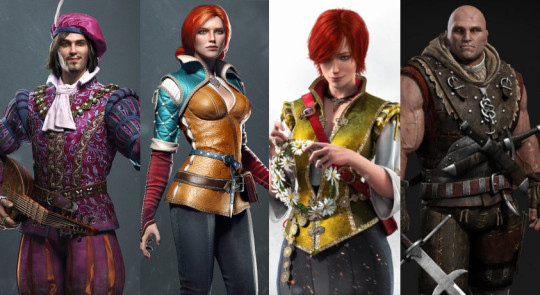
Geralt mostly gets away his own US accent by dint of being the very first character we meet, so we've gotten used to the way he talks long before we notice how he stands out – hell, maybe that's just how they talk down in Rivia (hilariously, book!Geralt eventually reveals he's not even from Rivia, but simply picked the place and taught himself the accent so he could feel a bit less like the abandoned foundling he is, which only gives us yet more excuse for why his accent might sound a bit weird). More importantly, Geralt is meant to stand out, to be the outsider wherever he goes, so having him sound like no-one else fits the character.
But neither Triss or Dandelion are "of Rivia", and by the time they show up we've had dozens of hours in a game where literally everyone else sounds British, or Scottish, or Irish, or vaguely-eastern-European in the case of the Nilfgaardians. So why do these weirdos sound like no-one else on the continent?
The short answer seems to be that every character with an American accent in TW3 is someone who had an American accent in at least one of the previous games, which were way looser with their casting and had enough incidental American accents around that they didn't stand out. Clearly, by TW3, consistency with prior games has been prioritised over consistency with literally anything else we’re hearing.
Gaetan is an exception to the rule as the only new character (at least that I caught) with an American accent – presumably because between Geralt, Eskel, Lambert, Berengar, and Letho (and cohorts), some sort of 'witchers have American accents' rule has been pretty well established (another random American-accented witcher shows up in Thronebreaker, just to underline the point). We're going to mostly ignore Jad Karadin here, since his British accent is presumably a recent affectation to go with his new identity, and so makes sense.
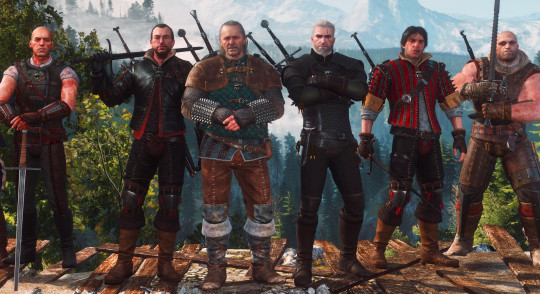
This still doesn't really work though, since Letho’s school is all the way down in Nilfgaard (land of the Eastern European accents), while the oldest witcher from Kaer Morhen (Vesimir) is the one guy with a British accent. He sounds nothing like any of his students, despite the fact he's logically the guy they ought to have learned their accents from. So the logic falls in a heap however you slice it, and I'm thrown right out of the game.
With TW3 as your intro to the series, it feels almost as if characters like Triss and Dandelion have been assigned American accents because they're just too important to be saddled with the same pedestrian British accents as everyone else, which did nothing to endear them to me. The only one I eventually warmed up to was Lambert, and then only because he's just such a bitter asshole that he eventually goes full circle and comes out the other side (somewhere around when you've heard his miserable backstory, then gotten drunk together and told him how much you love him, man). Gaetan similarly snuck in under the same clause – American accents clearly work better for me in this series when attached to characters you're supposed to find pretty insufferable on first impressions.
Some final notes
To conclude, it seems only fair to throw in a quick nod to some of the more memorable book-characters who don't appear in the games. Neither Mother Nenneke (Geralt's sort-of-surrogate mother) or Vissena (Geralt's biological mother) ever appear either, alas – Vissena doesn't even merit so much as a Gwent card, which seems quite the wasted opportunity.
Milva, Cahir and Angouleme – the three remaining companions of Geralt’s who died alongside Regis but who were not so easily resurrected – naturally don’t appear. But nor are even really mentioned in all the games, which seems rather less than they deserve after giving their lives to Geralt's cause.
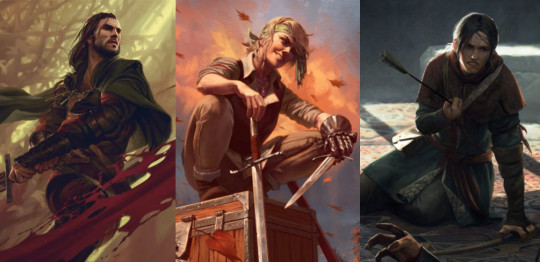
Cahir and Angouleme do at least have pretty badass Gwent cards to their names, though I am properly offended that Milva (who has the dubious honour of being my very favourite book character who doesn't ever appear in the games) is stuck with a card of her freaking death scene – which not only gets the scene wrong (believe me, there was no grimacing and gripping the arrow buried shallowly in her chest for poor Milva), but doesn't even bother to get her hair the right colour, for fuck’s sake. Basically, Milva was a stone cold badass and absolutely deserves better. #justice4milva
One can only guess how I'd have felt about some of these characters had I read the books before playing the games – I am obviously biased towards forgiving changes to characters whom I liked in their game incarnations, regardless of how they compare. Still, I think it does speak wonders that there still all these characters who suddenly made sense only after I'd met them in the books.
Even if only for Dandelion and Ciri, I can only dream of seeing a bit more of the book-original characterisations make it into the collective fannish consciousness. There's nothing wrong with getting into the canon purely based on the show or the games, but having read Sapkowski's novels, it's no longer any mystery how they spawned this massive franchise. That the saga wasn’t even fully available in English until well after Witcher 3 was released – a solid couple of decades late, and long after it had already been translated into Russian, French, German, Spanish and more – is a real shame. For once, it’s us in the anglophone world who’ve been missing out: these books deserve so much more than to be thought of as a footnote to the games or the show.
#Dandelion#Witcher novels#Jaskier#Ciri#Regis#Geralt of Rivia#meta#The Witcher#long post is even longer this time#I blame everyone who gave me such lovely feedback on that last post *g*
79 notes
·
View notes
Text
Thanks a lot for answering! I wonder could you please give examples of everyday deeds/types of behavior of different primaries and secondaries? Like what are they like when there's a school test or when they need to visit a doctor? The more the better. Something more down-to-earth than the situations from the fantasy movies listed on the website that may never take place in the real world, something found in everyday life that will help someone identify themselves and mb others around them
I’m not sure I can do that, because frankly, your Primary House is a state of mind. It’s what you want and how you feel about things (or do not feel, in the case of Ravenclaws, ahem). But I can talk about a few things, particularly in response to Harry Potter, that can shed light on the state of mind of the Primary.
What I have most noticed about people in general is that we all have a built-in bias, and in order to find our true type—whether that is our MBTI type, our Enneagram core and tritype, or our Hogwarts House combination—we must abandon our ego defenses. What does that mean? We have to overcome our biases and want to know our true self, and own it, more than we want to fight against an answer that might not please us. In the Enneagram, I’ve noticed particular biases against being a 2 or a 6. Everyone wants to be the more “glamorous” 4 or the elusive, bookworm 5.
Harry Potter, for better or worse, introduced us to the concept of Hogwarts Houses, but also introduced us to a bias, because it made Gryffindor the most glamorous House, due to all the main characters (however unrealistically) hailing from that House. Or, at least, all the main characters we like. Ravenclaw is full of wise weirdos like Luna Lovegood, who irrationally believes in things no one can prove. Slytherin is host to mostly back-stabbing, snobbish cheaters. And Hufflepuff is an “afterthought” where all “the boring, nice people are.”
What I like about Sorting Hat Chats is… they made the entire system more interesting and a lot fairer. Now, Slytherin isn’t the only House with villains automatically placed in it: their villains have to be specific in their love (and not betray their family, because it is the house of My Family is My Life). This also means people, fictional or real, who prioritize their loved ones, are Slytherins. Such as Mr. Darcy, or Katniss Everdeen. Suddenly, being a Slytherin doesn’t seem so bad, right? Not if you are loyal to the ones you love! That alone will appeal to the mindset of a Slytherin, because they will think, “Of COURSE I am. Of COURSE my loved ones come first! They SHOULD!”
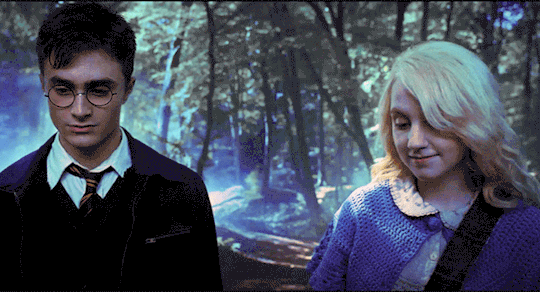
I have friends in all four Primary Houses, but I will use myself as an example of the Ravenclaw. When I was reading the books, having all the main characters in Gryffindor bothered me, because not only did it show a bias, but I felt some of the main characters ��belonged’ in other Houses—such as Remus Lupin being a Hufflepuff rather than a Gryffindor. I also felt like Hermione belonged in Ravenclaw. But that is neither here nor there… my objections to the system came from the logical flaws in how she arranged it. It wasn’t realistic to have everyone ‘important’ or ‘admirable’ within the story come from Gryffindor. It was easier to have them share Common Rooms, but people don’t isolate like that and only befriend someone from their House. They look for like-minded friends who share interests, and would make them all over the place. It was my little Ravenclaw brain, pulling away at her system and finding flaws in its logic, but reacting from a place of logical reasoning rather than moral indignation.
When I took the SHC test, it placed me in Slytherin. And I was not opposed to that. In fact, I explored it for a long time, as I thought about how I respond in various situations. Slytherin appealed to me, because… I wish I could stand up for my family automatically. I wish I could prioritize my loved ones all the time. But I kept hitting upon the fact that – I like to think about things in a detached manner, and come to what I feel is a rational consensus. It’s more clinical and less emotional than Slytherins are—and it helped at the time that I knew a Slytherin, and could easily see both how possessive she was of people (they are “mine to protect” – she always reminded me of Slytherin Sam Gamgee in The Lord of the Rings, with his “MY MR. FRODO”) and how, without fail, her sister came before even me, her best friend. Through comparison, I knew I had to be something else. So in typical Ravenclaw fashion, I went through and considered them all. Because, as a Ravenclaw, I want to be RIGHT more than protect my ego. I am always looking for the truth, even when it hurts. And I am always measuring the world against an ideal in my head, built up of my belief system. I do not go against my beliefs; I mold myself to them. And it shocks me to find others who do not, but who claim to be the same as I am. I take, for example, my Christian faith seriously—so what do you mean you are ignoring what your faith says, and doing whatever you want??? YOU MOLD TO YOUR BELIEFS, DON’T YOU? Well, yes, if you are a Ravenclaw, you do. If you are any other House, you do not.
The Hufflepuff Primary I know has a far more ‘felt’ opinion of the books and their sorting system. She got livid reading them, and thinking about how constantly unfair it all was, how biased Rowling was, and how Dumbledore was clearly playing favorites constantly with Gryffindor House. She developed a bad attitude about him as a result… which, of course, is coming from her being a Hufflepuff. To a Hufflepuff, people come first. They are all treated fairly and seen as equals. You do not discriminate, you do not alienate, you do not give unfair favors to Harry and his friends, just so Gryffindor can win the House Cup over and over again. She was actually so angry about this, from a Hufflepuff perspective, that she was willing to be a Slytherin in defiance of ‘The System’ until she realized that kind of mindset is… pure Hufflepuff. “You are not being fair about this, I will oppose you.” It’s all instinctual, it’s all emotional, and it’s all loyalty to the human race, which includes Slytherins. (This caused us some friction for awhile, until I realized it was “just a Hufflepuff” objection, because... how can you be mad at Dumbledore for that? It’s just a convenient plot device in the book! ... says the Ravenclaw who isn’t getting too emotionally involved. ;)
The Slytherin I know, by the way, denied being a Slytherin at first, because she felt ashamed of it. She has been taught to act like a Hufflepuff, that she SHOULD care about everyone all the time, but… she does not. She cares about her loved ones the most, and she would protect them above other people, every time. I pointed out to her that Hufflepuff fits her less than Slytherin, because “You ARE Katniss. You told me that once. That you identified so heavily with her, because you would go into the arena for your Prim.” And then she admitted it, and saw the gloriousness that is being a loyal Slytherin.
The Gryffindor I know is always looking for a Cause, and… as a Ravenclaw, I find that exhausting. She wants to be mad about things, because that anger gives her the fire she needs to do something about it. She has taken on big Causes by financially supporting the Causes she cares about, and done physical things about smaller Causes. For example, as a teenager, she came upon three guys tormenting a dog. It made her so livid, she charged straight at them, swearing and screaming at them to leave the animal alone, and it scared them all so much, they turned tail and ran. She just knew it was the right thing to do, and she and I often butt heads a lot, because she expects everyone else (meaning me) to be as passionate as she is about doing the ‘right thing.’ My more detached “well, let’s look at both sides of this issue” has no place in her black and white Gryffindor mind (no, that is WRONG).

Secondary Houses are… something that may take a little more time to figure out, as you think about how you handle the ‘unexpected.’
Gryffindors… have to speak up if they see an injustice, or hear something they disagree with. They are they person who cannot keep their mouth shut, they need to voice their opinion. They don’t care if you don’t like it or don’t agree, to not state their views would be antagonistic to their central self. My Hufflepuff friend is a Gryffindor Secondary. Not only did she get mad about the biases in Harry Potter, she complained loudly about it, to me, and to other people, and even in a blog post, because the injustice of it needed drawn-attention to, and dealt with, and she doesn’t really care if you disagree. That’s just how she rolls, about EVERYTHING. Because Gryffindor Secondaries state their views. They see an injustice, and they rush toward it. (My Gryffindor friend is also a Gryffindor Secondary: see dog being abused, rush in to do something about it!)
Ravenclaws… want to prepare for everything, and then rely on their own skill set to handle problems as they arise. They are the person who, when their bike breaks down halfway home, consider what they know about bikes (can they fix this easily?), and what they know about public transportation (am I going to be able to catch a bus home?), and make decisions from there. Or who study for a test in advance and show up, only to panic because they found out they read the wrong chapter in the book and know nothing about it. My father is a Gryffindor with a Ravenclaw Secondary, and he over-prepares himself with any useful knowledge he thinks he might need to combat a wide variety of situations—and then is stumped if confronted by something he did not prepare for, and knows nothing about. He is always trying to think ahead and prepare so that he doesn’t have to improvise anything at the last second—because he sucks at it.
It was a comparison with him that actually shifted me away from assuming I had a Ravenclaw Secondary, because… I don’t suck at improvising. I’m actually quite good at it. And I don’t over-prepare, because in true Hufflepuff Secondary position, I figure I can ask someone for help. And they always give it to me. But what really cemented the deal for me, in terms of recognizing my Puff Secondary House, were two—no, make that three, truths from my life. 1) Ravenpuffs distill complex information and put it back out into the world for others to enjoy (hello, Funky!). 2) Puff Secondaries show up and do the tireless work, clock the hours, and are highly reliable, which is… me. I have run this site day in and day out for years. I am punctual, fastidious, I put my responsibilities ahead of all else (even turning down fun occasions because I need to work), and I will painstakingly work on perfecting something, finishing something, improving something, or polishing something (even when I’m bored). In short, I show up and do the work. And 3) the truth that Puff Secondaries have friends to stand up for them, because they have proven themselves reliable and trustworthy, is no joke. A few years ago, I had trouble with someone online and, without being asked, three of our mutual friends came to my defense. Proof of the Puff.
Lastly, Slytherin Secondaries are highly adaptable. It’s no problem for them to shift their approach given the needs of the situation. It’s the equivalent of a friend you admire, but who puzzles you (if you don’t share their Slytherin Secondary trait) because… it seems like they are a different person everywhere you go, because whatever is needed, they can become it. They are the person who has no trouble with change and no need to plan, because they just trust that it’s all going to work out fine, based on their ability to adapt. It’s the person who shows up at a friend’s birthday party expecting it to be formal, finds out it’s casual, sneaks into the bathroom to rearrange their attire, and emerges ready to play Twister. Or who will be serious with you, joke constantly with your brother, and behave like a saint around your mom, according to whatever works and appeals to you the best.
Hope some of that helps, though it wasn’t explicitly what you asked for. Best this ENFP can do, since in-depth sensory specific examples require a heck of a lot more Si than I’ve got. :P
61 notes
·
View notes
Text

NSFW Headcanon: Jin Sakai
A = Aftercare (What they’re like after sex)
Jin believes practicing aftercare will naturally develop closer, more intimate bonds with his partner. After sex, he is particularly vulnerable; they’re naked, they have (hopefully) just had an orgasm, and one of the most intrinsic need for him is that need to ensure that positive state of mind continues. Everyone feels good when he knows his partner cares for him, and what better way to show it than tending to his partner when they both are in a vulnerable post-sex state of mind? Jin is especially susceptible to the post-coital blues, and even when he is seemingly highly independent, somewhat repressed and distanced with expressing emotions, I think this will be the perfect time for him to take a plunge and attempt to cuddle and engage in deeper conversations.
B = Body part (Their favourite body part of theirs and also their partner’s)
His entirety? Despite his fears of failure and flaws on his body, Jin Sakai is a man comfortable in his skin. From the crown of his head to the end of his toe, Jin Sakai has a body of a seasoned warrior; as a disciplined samurai, he had learned not only martial arts, but swordsmanship, horse riding, hunting, how to survive in the wilderness with bare essentials, and he literally has zero ounce of excessive fat on his body.
He’s not the strongest, biggest warrior, a powerhouse who can dominate and overwhelm enemies with brute strength, but he’s compact, sculpted with enough muscle definition, and corded with lean strength that only comes from meticulous care. Younger Jin used to hate the scar that would continue to bleed and bruise due to excessive bullying, but now that he is the Ghost, he thinks it only gives him character. After all, scars build character. And out of suffering have emerged the strongest souls; the most massive characters are seared with scars, and Jin Sakai is a prime example of one.
Jin isn’t very particular when it comes to his partner’s favorite body part, but if his partner has anything that contrasts Jin’s own, he would obsess over that and touch him/her over and over. It could be the sensuous curve of the woman’s narrow waistand widening hips, the budding swell of her breasts and slender neck, or another man’s expansive chest and strong arms and legs embracing and cradling him.
C = Cum (Anything to do with cum basically… I’m a disgusting person)
He doesn’t like the mess, and would prefer if he came inside his partner, but the one thing he finds it extremely appealing is coming on his partner’s stomach.
D = Dirty Secret (Pretty self explanatory, a dirty secret of theirs)
Jin loves talking about sex with partners, friends, whoever. To him, sex in essentiality is a fascinating subject that's different for each individual yet common to people all (in some way), and he finds it endlessly depressing that it's a taboo subject.everybody (for the most part) needs sex and wants to have sex, so Jin believes that people should be able to talk about it openly, and he will sass and awkwardly joke and humor with insinuations of sex in normal conversations.
E = Experience (How experienced are they? Do they know what they’re doing?)
He snuck into Clan Sakai and Shimura’s personal archive / library and would sneak in some erotic illustrations of the time in curiosity. Despite the general lack of experience and focusing on his strenuous trainings, he would have fulfilled some curiosity of sexual exploration through masturbation and through secretive excursions with Ryuzo.
F = Favorite Position (This goes without saying. Will probably include a visual)
His preferred positions are; The Victory position, Doggy Style, Shoulder Hold, Lifted Missionary, and Lotus
G = Goofy (Are they more serious in the moment, or are they humorous, etc)
Appearing too serious is Jin Sakai’s greatest flaw; being too serious which is Jin’s principal trait doesn't seem like such a bad thing, but it could create some issues regarding sexual explorations.
Social anxiety.
Perfectionism.
Social awkwardness.
Fight or Flight responses to most things (Can't laugh inconveniences off or smoothly escape conflicts because of over seriousness, which is likely to do the opposite, in other words escalate minor conflicts to big ones).
Overthinking and not living in the moment.
Not having fun due to exaggerated thinking about the consequences.
Jin may be a sassmaster and likes to throw in some dry humor in between, but that’s his coping mechanism to lesson and ease his insecurity and stress that stems from even the sexual act itself, but in the act, he’s deadpan serious.
H = Hair (How well groomed are they, does the carpet match the drapes, etc.)
Judging by the full thatch of his beard, I’d like to think that he’s pretty thick and ample down there as well, peppered with hair below his belly button, and a nice, sizable thatch of his pubic hair.
I = Intimacy (How are they during the moment, romantic aspect…)
Jin does crave intimacy during sex, and this is something which becomes very important to him. Jin is at his most vulnerable, candor, raw, and open, and if it’s not a casual sex only to fulfill the needs to get off than anything else, Jin still needs and wants to build some sort of friendship or connection beforehand. Their sexual performance is then more about action than it is about emotions and deeper layers of intimacy, and with more deeply-connected intimacy, he would rather focus on both the physical and mental connection, which could make it much difficult to come with him. Regardless, he is tender, and will attempt to initiate; especially stroking his partner’s back, the side of his/her face, raking through his/her hair, etc.
J = Jack Off (Masturbation headcanon)
Jin likes the stop-squeeze technique, which is a form of ejaculatory control. It allows him to near the point of climax and then back off suddenly by holding the tip of the penis until the sensation subsides. He likes to do this multiple times to make his orgasm much more intense. While it could be a tedious or time-consuming practice, he likes that explosiveness and exquisite high he gets from it.
K = Kink (One or more of their kinks)
Shibari (kinbaku), aka rope sex: Contrasts are central to Shibari: intricate geometric patterns with the natural curves of the body, rough rope against soft skin and vulnerability side by side with strength. The practice can also lead to a trance-like experience for the tied partner and a rush of adrenalin for the artist, or rigger.
Erotic Asphyxiation (breath play): This type of sexual activity involves intentionally cutting off the air supply for you or your partner with choking, suffocating, and other acts. People who are into breath play say it can heighten sexual arousal and make orgasms more intense.
Dirty Talk: Jin can have a little trouble getting out of his own mind. However, in this case, it’s less about being able to connect to the body than it is a fear of letting go. A little dirty talk goes a long way in making him forget his fears and let loose.
L = Location (Favorite places to do the do)
Taking in consideration of his fugitive life, it would be somewhere relatively hidden and private. Especially in nature; against the tree trunk, near the lake or an ocean when the weather accompanies Jin’s mood, and empty, abandoned houses.
M = Motivation (What turns them on, gets them going)
Jin is almost always turned on, and has higher than normal sex drive. He’s one of those who craves intimacy and wants to share himself with someone special, even though it doesn’t mean that he wouldn’t participate in any given opportunities when they are presented. It can feel like a chore and not really something he wants to waste their time or energy on if they cannot converse well to begin with. There must be underlying honesty and genuinity in order for Jin to at least partake in a casual sex.
N = NO (Something they wouldn’t do, turn offs)
Cockiness – specifically unwarranted arrogance accompanied by a smug attitude. Lack of a sense of humor – unless they’re the one dishing it out. Flaking – because flakes are some of the most unappealing individuals to build any type of relationship with. Being goalless and content with life — having zero aspirations for the future. Liars – but not even about significant stuff. Just unnecessary lies, made up stories and exaggerations when a fib is pointless. Vulgar language finding its way into every, single, sentence spoken. Baseless cattiness, malicious comments and disdain toward others. Humiliation and degradation. BDSM for BDSM’s sake without exploration, caution, and mutual respect.
O = Oral (Preference in giving or receiving, skill, etc)
He’s much more inclined to receive than give. While Jin lacks the scope of experiences, he is skilled with his tongue, very attentive, considerate, and careful to observe his partner’s reaction. Because he is a perfectionist, he will attempt his absolute best to pleasure his partner and send him/her over the edge. He expects the same when he’s on the receiving end.
P = Pace (Are they fast and rough? Slow and sensual? etc.)
The act in itself is viewed essentially as a series of steps to his and his partner’s mutual satisfaction. It entirely depends on their shared needs. As a dominant top, Jin is likely to be a very passionate lover, focused on the connection he gains from this experience. He does appreciate and sees how much closer sex can bring him to someone he loves, and would rather be patient waiting for the right person to share this with, because for him to reach this step, it would have taken a lot of trial and error. He definitely likes things to built up towards the climax, exploring different positions to find their needs satisfied.
Q = Quickie (Their opinions on quickies rather than proper sex, how often, etc.)
Jin actually prefers quickie, because it offers a much-needed opportunity to relieve stress, strengthen a relationship, and get off at a time when intimacy, connection, and, well, time, are luxuries (especially with him on the run). Prefers mutual masturbations, than penetrative sex.
R = Risk (Are they game to experiment, do they take risks, etc.)
Jin is likely to be a very passionate lover, focused on the connection he gains from this experience. He sees how much closer sex can bring him to someone he loves, and would rather be patient waiting for the right person to share this with. If he’s in a long-term relationship, he will be more than willing to experiment and take risks. It all depends on their shared interest, and Jin would be open to try everything at least once.
S = Stamina (How many rounds can they go for, how long do they last…)
From his strenuous training as not only as a samurai, but as the Ghost on the run, Jin has extremely high stamina and will be able to go on for more than a few rounds if his partner is up for it.
T = Toy (Do they own toys? Do they use them? On a partner or themselves?)
Occasionally will use Geisha balls / beaded necklaces for added pleasure, mostly one another in reciprocated masturbations.
U = Unfair (how much they like to tease)
He isn’t very good at teasing, unless it’s with words. He is rather straightforward with his actions, because he doesn’t like to deceive with his affectionate, tender touches.
V = Volume (How loud they are, what sounds they make)
On the quiet side, and for most of the lovemaking, he will make soft, gentle moans that turn into animalistic grunt when he’s on the verge of orgasm.
W = Wild Card (Get a random headcanon for the character of your choice)
Perhaps one of the simplest, yet most potent sexual fantasies Jin has is just having his partner direct the sex script for the night. Whether it's a full-on dominant or simply a partner who knows what he or she wants and how to get it, he finds the thrill of a confident and sexual partner to be very appealing.
X = X-Ray (Let’s see what’s going on in those pants, picture or words)
He is uncircumcised, his shaft is curved slightly upward, with veins that snake along the underside. His member is longer than average (around 13cm when erect) and has considerable girth (9 centimeters when erect).
Y = Yearning (How high is their sex drive?)
Jin has rather active sex drive. It’s not a particularly powerful sex drive, for he could always resort to, and might prefer his own imaginations. His inner minds are rather rich place, and he doesn’t always feel like outwardly expressing this side of himself.
Z = ZZZ (… how quickly they fall asleep afterwards)
All depends on Jin’s condition on that day; judging on the Ghost’s life (on the run, essentially a fugitive ronin), and a slew of traumas and PTSD trailing his back, Jin Sakai suffers from insomnia. While he has high stamina and could go for more than a couple of rounds when he’s in a particularly frisky mood, but one intense round could have him knocked out exhausted. He’s a kind of a guy that sneaks in sleep whenever and however it comes, so he would let himself fade away for an hour or two, before he’s coaxed to awake.
#▬▬ι═══════ﺤ || the storm of clan sakai (headcanon)#(nsfw)#jin sakai#ghost of tsushima#(compiled into one large post)
63 notes
·
View notes
Note
23 & 31? :eye: for either or both

Of course aid anything 4 u <3
Uncommon Questions [ accepting ]

23. How does envy manifest itself in them (they take what they want, they become resentful, etc)?
For Gio: Envy is... kind of a scale of ugliness for Gio, to be honest. First and foremost his envy is typically not something ugly; It's typically something that turns more into a hopeful longing other than any sort of truly resentful behavior. Just because he wants what someone else has doesn't mean that he needs to take it from them necessarily; the world is not a pie to be split among it's inhabitants. He views the world as an endless wealth, and if he wants something someone else has, all he has to do is work to get it himself. Ultimately his longing to be human and to take a quiet role in human society spawns from envy of the lives that humans lead.
... And then there's the far uglier envy. Gio is a rather childish individual who experiences emotions very strongly; In part this is subconscious acting, and in part it's genuine truth; He's really never been good at things regarding emotions primarily because he's never been taught a whole lot in regards to control of ones emotions or ways to manage them. He's a bit... emotionally stunted but more in the 'seems like an erratic mood swing-y mess because he feels very strongly' sense and less, you know, [gestures at Baal and Zhongli]. There is thus always a chance that when Gio becomes envious of something, his first reaction is that of intense resentment towards whoever it is that has what he doesn't- This is partially true even for his love of humanity. Even though he starts off with the thought of "this is beautiful" it was still interlaced with a lot of bitter resentment that he would never really have that; Coming to terms with his worldview is what got rid of that. But it's a bit harder to have a mentality of 'the world isn't a pie; someone having a bigger slice than me doesn't mean i can't have more if i want it' when its... say...
A person whom you love whose fallen for another or is having all of their time taken up by them.
For Riga: ...Riga gets a much shorter paragraph and for that I apologize, but I have a lot more thoughts regarding Gio on this subject considering that lil clowns got a lot of conflictions and nuance to ramble about. Riga, on the other hand, tends to be far more simplistic in the things he is feeling and how he is feeling them; though this isn't to say he feels any less strongly or erratically than Gio does.
Rigatello typically feels envy as a genuinely ugly awful emotion that typically results not just in resentment but in a very, very intense form of frustration. A major part of his character is that he is someone who wants very little, but the few things he does want are things he perceives more as needs; Case in point being he doesn't perceive wanting Gio to care about him as being a want, he sees it as a need, and when your needs are denied you become... what? Angry. Frustrated. Depressed. Envy turns him violent, because why should others have what's rightfully his? Why are others entitled to the few things he truly needs? Why is he not deserving of these things? There's a tangible cycle to a lot of Rigatellos emotions, and it's that he is confronted with something ( or someone ) he wants; He becomes reliant, he thinks he needs them ( using gio as an example; He cannot imagine who he is without Gio nearby. He cannot imagine himself in the hierarchy that is set between them both and Dottore without Gio there, because Gio has always been the one to provide a release of tension, even if the relationship the two of them shared was at times very far from healthy; The change of something he sees as being integral to his identity and his place in his little corner of society is something that throws him VERY badly; Rigatello is someone very afraid of any meaningful change because the fear of what comes next and that change leading to potential failure is one that haunts him ) ; They move away from him, and he panics, because he has very little and thus clings desperately to what few things he has; Cue the cycle of seeing that which he 'needs' with someone else, being angry, being frustrated, falling down the rabbit hole of wondering why he isn't worthy, arriving at depression, resparking that frustration, and... repeat.
A lot of his envy spawns almost purely from a place of this frustration-depression loop of wondering why he isn't good enough-- something that ties in heavily with the way he was 'raised', where threats of being scrapped were thrown freely, and any failure could potentially result in his literal destruction.
Wait this wound up being longer than Gios. Whoops.
31. Who are they the most glad to have met?
Okay here's where we ease into me being able to make coherent sentences again bc i'm not bound purely by my muses emotions <3
For Gio, It would be Venti, in more ways than one. First he had technically met Barbatos. The ideal Barbatos gifted to Mondstadt that rubbed off on the freshly-created and quite impressionable Gio; It was Mondstadt and their talk of freedom that lit the little fire that eventually turned into Gio pursuing his autonomy and humanity. Then was the archon; Barbatos gave his vision to him, and without that Gio never would have managed to escape Dottore, and if he didn't currently have it he wouldn't have been able to evade capture for this long. It also served as a constant reminder of Mondstadts ideals -- And not just that, but the special shape that the vision takes has always been a symbol that although Snezhnaya was his home-- Mondstadt was where he belonged. Then came Venti; Someone who made him feel welcomed in Mondstadt when he was initially very nervous about being there. He and Venti became dear friends ( possibly more ) and now that's someone he looks forward to every time he's on his way back to Mondstadt. The city truly feels like home to him now, and that's mostly because of Venti-- and even if his friend doesn't wish to be seen as Barbatos the archon, Gio cannot help the appreciation he feels for those previous actions, nor for the general ideals that Venti / Barbatos inhabit.
For Riga, that would be Lio, no contest. It.. it would take me ten years to explain all of Rigatellos feelings towards Lio there's so much shit at play they mesh so fucking well together their traumas and mentalities are such similar echoes, Lio is literally the only person in the world that Rigatello has felt genuine love and affection for and not in some way panicked and tried to burn the bridge before it could burn him; He feels genuinely safe and happy with Lio, and the fear that constantly haunts him is eased in their presence; He trusts not just Lio but himself, the fear he typically fears when he touches others is gone because they trust him so thoroughly that in the midst of their love it's hard to be afraid of himself. He feels for once that he can be something that protects instead of something that exclusively does damage; He feels cared for, wanted, loved, when all his life he's felt rejected and constantly on the brink of destruction. Where he once was told his wants and thoughts don't matter he has now found someone who cares very much for what he wants and what he thinks and FUCK I have a lot of thoughts about these two.
40. How sensitive are they to their own flaws?
Oh god, here's another thing I can't fully explain.
For Gio: Immensely. Gios current mentality is essentially that if he just closes his eyes and refuses to think about it then he doesn't have to deal with his flaws, and if anyone points them out he can just get mad about it and avoid them until he dies because he does. not. want. to. think. about. it. He HATES feeling bad, he hates feeling negatively about himself, he doesn't... know how to genuinely change things about himself; And I think that. That itself can be very much shown in how he treats the fact that he's not human? A person? Yes, he's a fully sentient person with his own thoughts and expressions and free will, a human? Not exactly. He's made out of metal and circuitry and artificial materials, and this is simply a factual statement, its not opinion; But he almost treats it like it is. He sees this idealized version of humanity that he wishes to be a part of but he cannot fathom how he can be apart of it if the core thing about himself isn't changed, but its NOT something he can change; Instead of accepting that, however, and still going on with his goal to pursue his autonomy and humanity despite this, Gio would... honestly rather stick his fingers in his ears and go "lalala" because he doesn't really have the toolset to mentally deal with the contradiction of "I want to be human but I can't". He perceives a need to change that isn't there, and instead of trying to address it he ignores it entirely in hopes that... it'll just stop being an issue that he needs to address with himself at some point. The same mentality applies to a lot of his flaws. Does he know hes being avoidant of his problems? Does he know that it's going to cause more issues in the future? He does. But he can't even address it with himself because it makes him feel bad, let alone with someone else who could actually provide him with skills that he needs to change his behaviors and mentality.
For Riga: Okay he genuinely gets a shorter paragraph this time because in short? Rigatello doesn't care. Admittedly he kind of wears his flaws on his sleeve. He's a "says it right on the tin" kind of guy most of the time, where he's typically mostly open about the less positive parts of himself-- If not exaggerating them as a means of keeping people away. There are of course the flaws that he hides due to them stemming from traumas, and his general desire to hide all things relating to his personal thoughts and feelings-- But this in and of itself could be perceived as a flaw, though one very unexplored considering Lio is his first close relationship with another person where he's been in any form open about his own thoughts and feelings, away from the influence of Dottore or the Fatui.
Rigatello does have... slightly less healthy perception of what counts as flaws in himself, though, such as having his own thoughts and emotions. He perceives his traumas as weakness, and weakness is a flaw, to him-- So too, then, are his traumas. He's not sensitive about this in the sense that Gio is where he's willfully ignoring something he's doing wrong; Riga doesn't... know that this isn't a good mentality. He.
Riga is kind of hard to explain this regard because of how severely impacted Rigatello is by the traumas hes endured, the people he was 'raised' by, and the current lifestyle that he leads. His emotional understanding is extremely limited and always has been, and I'm not entirely sure how to put it in coherent wording; Because typically when I try to talk about Riga and emotions it devolves into word vomit because his thoughts are just... nonsense screaming pain mush that he doesn't know how to cope with so he tells himself to toughen up, shoves it in the closet, and goes on with his day until he can lay down at night and have a meltdown--
E) Are they someone you would get along with? Would they get along with you?
Honestly? The general rule of thumb is that I don't typically write people that I myself would get along with, if only because I know way too much about my own characters and their flaws? When. I look at people that I get along with, its primarily people who are patient enough to deal with my memory issues and my general lets say... low iq, to be nice. They're mostly laid back people who don't give too much of a shit one way or the other, but are friendly and fun to talk to because they have interesting ideas to contribute to a conversation, give room for others to contribute, and don't mind a bit of chaos when things inevitably devolve.
When I look at the characters I write... They all have some sort of flaw that directly contradicts the core things I typically find in someone I get along well with?
Gio is someone who I think I could get along with for a while; But inevitably his flaws, his distress regarding those flaws, and his subsequent refusal to acknowledge them in any meaningful form would inevitably stress me out and it would start to get tiring.
Bluntly put Riga is scary and I feel like I'd be stressed out 24/7 that I'm going to irritate him... And his general mindset of emphasizing his own flaws to push people away would just make me angry and I'd probably wind up letting him isolate himself because, having once been someone who was very much that way, I no longer deal well with that degree of self-pitying behavior b/c it pisses me off.
Outside of this blog, Ku Shen and I could probably get along pretty well, but I think the issue is that he's a massive introvert who would go Weeks in-between texting, and I have the memory of a goldfish and i'd inevitably find myself in a position where i have a text from him that's been waiting for me to answer for the past week and I'm too nervous to reply because I feel awkward being like 'hi i have untreated adhd sorry', and then suddenly three months has passed and I just can never talk to this man again.
...I'm going to include my Morax on here as well even though it's blog isn't super active; Look I might actually be able to chill with Morax if only because we vibe in either 'i am listening to you ramble for 3 straight hours with occasional questions or commentary' or 'we have both been dead fucking silent for the past 3 hours' and these are both my ideal ways to exist in someone elses presence. Also I feel like it'd wanna do fun shit and likes going on walks or smth. 10/10 I think I could get along with Morax.
H) What trait do you admire most?
Ah fuck okay. Uh. For Gio... I admire his optimism and hope. I consider myself to be a generally hopeful person but I'm not typically the kind of like... ~ * direct action * ~ person, and Gio VERY MUCH IS in most regards. He's generally super fucking ambitious and if he WANTS something he will GET IT and you cannot STOP HIM and I just wish I had that level of
I. Dedication II. Energy III. Optimism in actually completing the goal
For Riga? I guess it would be his general tenacity and endurance. He goes through. A lot of shit. Constantly. And he just keeps trudging on forward without pause. He does what he needs to do, and if you get in the way of him and what he needs to get done, then he'll make you fucking regret it. Top tier shit 10/10 good for him.
#❄ ⤚ ᴏᴜᴛ ᴏꜰ ᴊᴏᴋᴇs ( ooc. ) ⇾#❄ ⤚ ᴛᴏss ᴀ ᴍᴏʀᴀ ( inbox. ) ⇾#oh... my fucking god this is a long post im so sorry
3 notes
·
View notes
Text
Ok I had thoughts in the shower that are kinda serious/about something mature and I felt compelled to share. CW for discussion of prosh/pp/ng. If you do that and somehow found this, not sorry, this post isn’t for you, also stop doing that and get help. Won’t tolerate any clowning either.
I think the main reason “proshippers” get away with That a lot is because in many cases they’re warping actual fair arguments. Like, yes, there is not necessarily something majorly wrong with portraying unhealthy relationships, because they exist in real life, and ultimately all art reflects aspects of real life. It’s in the same boat as the fact that it’s not bad to portray bad people or horrific events. However, all of that hinges on whether or not these things are being shown for what they are; if you keep saying/implying a character is good or cool or “relatable” and that character is in a situation like that– victim or perpetrator– you are automatically glorifying that thing. You can’t write it off as “just a character flaw” if it is not being portrayed as a flaw; that’s how character flaws work, because ultimately the vast majority of flaws can also be virtues under the right conditions, and vise versa.
Then people make the argument “well authors/artists/etc don’t have to spoon feed what is and isn’t ok to their audience”, and while that is true on some level, that does not mean they have no responsibility at all. Not just to people consuming that content, but to themselves. If you write something terrible and put it in a good light, or what can be reasonably interpreted as a good light, you can’t get mad if people assume you are supporting that thing. In that situation you have not given any true evidence that you don’t; “I’m not x” isn’t enough, because people can lie. Generally, most murderers don’t answer honestly if someone asks them if they killed someone or not. Actions speak louder than words, and if your action is writing, you are responsible for what that writing reflects on you and your views. If people come after you for it, that’s a sign that you should reflect on what you’ve written, and what message it is sending. Even if you had good intentions, people don’t see your intentions, they see what you produced, and sometimes the two don’t line up. Cancel culture is a pain in the ass, but so is the fact that the proship movement allows legitimately disgusting people to thrive under the cover of plausible deniability.
In the case of fan content, there’s the simple fact that not all franchises are safe mediums for making that stuff. It’s not censorship for someone to tell you not to make that content if you’re making it with the characters/the universe of a children’s franchise. Because ultimately, that franchise is going to be majorly consumed by children. It doesn’t matter how well you tag things or how many warnings you put on it, because ultimately the internet is going to put that thing in front of eyes that can be harmed by it. I am saying this as someone who’s first exposure to porn, before I was even in highschool, was Kirby fanart on Google images, despite having safe search on. In the grand scheme of the Internet, the only control you really have is whether you put something on it or not, and where you put that thing, and this is a situation where that is an incredibly important decision. Do you post it on social media where it could very easily be exposed to people who should not be exposed to that, whether because of algorithms or others being less responsible? Do you post it privately in a place where you know(or assume) the other people there are responsible and not going to circulate it? Or, do you keep that content to yourself?
That is not you being asked to be a “second parent”, this is not a “think of the children!” argument. Or, rather, it is a case of the latter, but one that is justified. If you’re making that content with original characters, or characters from a mature franchise, thinking of the children isn’t a priority because the children aren’t supposed to be there, just like you’re not responsible if you’ve been made to share a house with a kid that ends up finding your stash of Mature Things. Whether it was them snooping around without permission or you told them to stay away from that drawer and they didn’t listen, that’s the kid’s fault either way, and thus you bear basically no responsibility. However, if you make that content in a franchise that is consistently, obviously, and intentionally made to be consumed by children, even if it can also be enjoyed by adults? That’s different. That’s like walking into a playground with a porn magazine; it doesn’t matter if people your age can enjoy some of the things there, like the swings or basketball court. You need, and are expected, to take into account that kids are not only likely going to be there, but are encouraged to be there. You walking in with that magazine is you willingly choosing to expose or risk exposing minors to content they should not be exposed to, no matter how you spin it. You could read that magazine anywhere else, and you chose the area with kids in it.
Lastly, while I could make the argument of what reasoning there may be for wanting to make That Stuff with characters from a children’s series and then share it online in the first place, that’s been done by plenty of other people. Besides, I have a better argument: there is nothing stopping you from making that content with different characters anyways, be they your own or just from a franchise with a mature audience. You are not forced or limited to only portray a certain dynamic with certain specific characters. If the setting/universe is a factor, just make your own version with the relevant things in common, maybe change some terms and names, and there, problem solved. It’s not plagiarism if it is going to be utilized in a vastly different way, and as long as it does not just flat out copy every single aspect of the original. Something something a lot of fiction is derivative. Doing this could also allow a place for others to make similar content in what could eventually be your own “series”, without nearly the same level of risk of harm. If it is truly a case of just wanting to explore the dynamic, you can do so without having it be inherently tied to content made for young audiences, and if you have the skills and critical thinking necessary to understand both what makes it “special” with those characters, you should also be able to recreate the same thing in a safer environment.
I know I kinda focused a lot on “kid’s franchises” with this but the same things apply with other content. I.E. don’t make content that depicts mentally ill folks as dangerous where it could hurt/offend real mentally ill people and misinform those who don’t know the reality of mental illness. “Common sense” isn’t real; all “common sense” is learned, and not everyone has learned the same things you have at any given point. How else would ridiculous rumors and such spread, if everyone knew the truth?
TLDR:
-The issue isn’t you making the content, it’s you glorifying the content. Whether you intended to or not isn’t the point.
-You don’t have to spoon feed morals to your audience, but if people reasonably interpret unhealthy things shown in a light that isn’t explicitly or implicitly negative as your quiet support, that’s on you. You need to be sure that the message your content actually sends/how it reflects your views lines up with the message you intended to send and the views you actually have. Don’t blame others if you were the one who failed to communicate effectively.
-In the case of franchises specifically aimed at children, you posting that content is you saying you value sharing that content over the well-being of those likely to see that content. You had the choice to keep the risk of harm at 0%, but decided not to.
-That fact is not a “think of the children” argument, it is simply making the same point as someone telling you not to bring pornography into a kid’s playground, even if that playground has facilities others your age also enjoy. You are bringing adult content into a kid-oriented area, you cannot act like it is the fault of a kid for finding it when in some cases they weren’t even looking.
-There is ultimately no excuse for making that content within a children’s franchise, because there is nothing forcing you to remain in that setting and use those characters; if the dynamic is something you really want to explore, you can recreate it without ties that could lead minors to it.
-Though I used kid’s franchises as my main focus, this applies to any groups that your content could potentially harm or misinform. “It’s just common sense” is not a defense for the latter, because “common sense” has to be learned, and not everyone learns everything at the same time or by the same age.
#ask to tag#rambling#cw proship#ok to rb#just my thoughts on the matter#lemme know if this needs more tags I’m tired af and just kinda spat all this out#also yes I know this is basically the same as taking a bat to a hornet nest no I don’t care#let the hornets come I’ll fight them#or block rather#I will not give the hornets my time or attention
2 notes
·
View notes
Text
Black clover is an amazing show/manga and anyone who disagrees is wrong. Yeah thats a strong statement but its true. Black Clover is shamelessly shounen but in the best way possible. The main character is an underdog, so far so shounen, but the thing that makes him different is that his underdog status is never magically resolved, yeah he got a cool new power but unless he had spent years training his body that power would be useless, and as the witch arc showed us even after he got the power he had to do a whole training montage with a weird guy in the woods just to learn how to use it properly, his skill now is a culmination of a decade of work and everything he achieves will be because he put in the effort. Also people don’t recognise that he is as amazing as we know him to be, he's just that weird kid from the black bulls, the kid with no magic, he doesn’t get taken seriously until he shows off what he can do and even then some people still think that there's a trick. This is starkly different from shows like BNHA that give like an episode long training montage and then kinda call it good enough, give the mc a cool power and then they use it recklessly. Asta is painfully aware of his own incompetence. He knows that if he screws up thats it, so he has to be careful with his body, take care of it, eat, sleep and keep up with his exercise or else he’s doomed. “He still got hurt” I hear you say” and you’re right, he did get hurt because it was hurt his arms or let everyone he cared about die, and then he sat there yelling at fate saying he’d find another option and that he won’t stop. Its a kind of shounen tenacity that you don’t find many other places, in mha if izuku hadn’t been given a quirk he probably would have given up, he was kind of fed up with being told he couldn’t do it and was ready to agree, Asta only agreed once and for a single moment because the moment he stops thats it and he knows it. How they incorporated rivals was fantastic, most shows pick one or two rivals and that's about it, but in black clover just about everyone has declared themselves astas rival. They are acknowledging his strength and daring both him and themselves to do and be better. It lends an air of intrigue and tension to just about every scene he’s in because they’re competing, always This leads into my next point, the pacing is fantastic. Maybe not in about the first 18 episodes which was largely responsible for its downfall in the anime community due to the (bullshit) "three episode rule". However its like demon slayer in that it goes from action to action to action, it gives you maybe an episode or two of what me and my friend call "TA episodes" where it gives you a moment to breath but otherwise its moving forward, every action scene progresses the plot or the characters in some unique way that makes it so you can just...binge it all since the end of the episode is never the end of anything, theres always something more, something to wait up at night or to wake up early for when the new episode airs. It does have a "harem" I guess if you wanted to call it that, which lends back into the "shamelessly shounen" aspect of the show but it doesn't disgrace these characters, the three characters who are in love with him, noel, mimosa, and that girl he saved in that town that one time (can't remember her name, sorry) haven't changed anything about themselves to make themselves more appealing to him, they don't fall over themselves for him, yeah they're awkward but like...thats how love works. There is only one "fanservice" character in the whole thing, which is vannessa however shes not dressing for anyone else but herself and despite the fact that shes wearing a bra and panties and drunk af most of the time none of the characters sexualize her and treat her badly/as less than because of it. This show drinks its respecc women juice and you cannot change my mind on that. On that point, although there is a clear male female imbalance within the group the women are pretty strong and they're hella respected, nobody fucks with meleorelona, nobody questions dorothy unsworths place in the captains even though she sleeps all the time, a whole squad of girls? yeah and nobody teases or gives them shit for it kuz they know they will get beat the fuck up. Also going back a moment, Asta, despite having a harem only has eyes for one girl!! his whole life he just wants to marry the nun from the orphanage he grew up at, he has girls desperate for his attention and he still just wants to marry this one girl and if that isn't the greatest dedication you've ever heard of in a shounen (aside from everyone loving nezuko in demon slayer) you get get the fuck out. Then the foreshadowing, the whole first arc/plot story thing with the elves had so much foreshadowing, they played the magic king defeating the demon in the start of every episode and I had no thoughts I skipped it every episode after the first like 20 times and then it shows it again and you learn this giant lesson about how there are often two sides of the same coin, because to the people it was "yeah the magic king defeated the giant monster" but to the magic king it was a mercy kill on his best friend who didn't want to hurt anybody but it was the best of his few and all bad options. It was the biggest slap to the face that nobody expected but it was perfect anyway. Thinking about duality, many people in the story have an issue where they were brought up a certain way and think a certain way, often that they are incapable, or that their power is somehow flawed or useless. But the show straight up says that its not that your power its useless you just haven't found the right application for it yet. noelle thought she couldn't do anything but with more training, a wand, and more defensive spells or the suit shes able to accomplish things she never thought she could. Finral was always told his magic wasn't useful because it was passive rather than attack magic, but when used in conjunction with vannessa and asta they were able to down one of the eyes of the midnight suns biggest guys, it wasn't that he was useless he just wasn't thinking of how to apply it to make it useful before and now that he does he has so many options its amazing. these are just my off the top of my head reasons why I think that black clover is one of the best shows ever but yeah, tell me what you think, or not, totally up to you.
#black clover#asta#noelle#mimosa#yami#yami sukehiro#finral#black clover finral#meleorelona#mereoleona vermillion#fuegoleon vermillion#leo vermillion#yuno#wizard king#first wizard king#julius#nero#licht black clover#black clover is resuming and these are my thoughts#shamelessly shounen#vannessa
100 notes
·
View notes
Text
Wicked: a Gamer’s Look at Morality
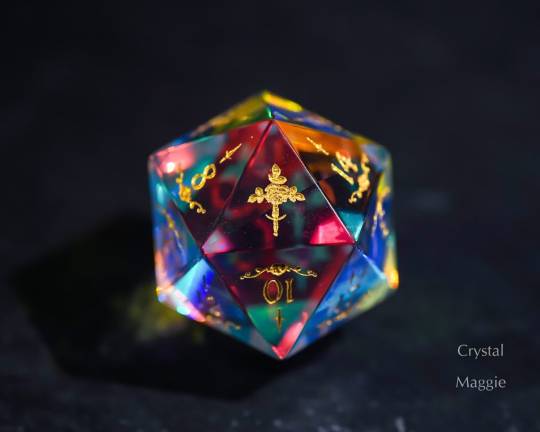
(pic is from an Etsy store, I really want these dice, they’re freaking gorgeous)
A few years back, I was one of a handful of admin on a roleplaying sim on Second Life, and I was put in charge of teaching basic roleplaying skills to people new to our game. There’d been a shift in our rule structure, a move towards a more formal rule set very similar to Dungeons and Dragons, and I had to adapt my workshop to reflect that.
Some of you who know me are already cringing on my behalf. Yep, I’m one of those gamers who loves tabletop roleplaying games, but just... really dislikes D&D. A lot of my friends already know about my laundry list of complaints (unrelatable magic systems, the ridiculous idea of “evil gods,” unrealistic rules... it’s a long list), and I’m not going to dig too deep into it for this story. Suffice to say, I have some opinions, and we’ll leave it there.
Ordinarily, I leave my list at home, and just try to avoid playing standard D&D. This time, however, I had a bunch of friends counting on me to help our players adapt to the new rules, and that meant dealing with some of my prejudices, and turning some of my objections into experiments. One such experiment, and arguably the most successful one of the set, was an experiment in D&D morality alignment.
I should preface all of this by saying that I told this story in a shorter form on a Facebook group I follow, a DnD players’ group, and that’s what got me thinking about it and wanting to share it with all of you. Yes, I do realize the irony in being a member of a group centered around a game with which I have so many issues. I’m a geek, we’re allowed to be inconsistent in the pursuit of our fandoms. Anyway, someone asked about alignment, and it brought up the whole story for me again, so I’m sharing it with you now (and I’ve also shared it on Facebook), as I feel it’s kind of relevant these days.
Now, those of you who are familiar with D&D already know what the alignments are, but for those new to it: every character you play gets a moral alignment based on a combination of two sets of three traits- Lawful, Neutral, and Chaotic, and Good, Neutral, or Evil. You can play a Lawful Evil character, a Neutral Good character, a Neutral Neutral (called True Neutral) character, a Chaotic Good character, and so on.
Dungeonmasters and storytellers and writers have expounded for years on what those alignments really mean. Before we nerds had “what is your Hogwarts House?��� quizzes and discussions, we had “what D&D alignment are you?” debates. And frankly, I always hated the whole system. What rational person would willingly choose to align themselves with “evil?” How the hell are you going to find someone who’s objectively “good,” or “neutral” for that matter? And how about the whole “lawful” vs. “chaotic” concept? These are none of them rational or practical character motivations or personality frameworks, and they afford players the ability to become unrepentant murderhobos far too easily, to the point where there’s a whole genre of roleplaying centered around that mentality called “hack n slash.” Like, that’s part of the appeal for some people. I don’t get it, I don’t enjoy it, and it bothers me enough that I decided to change things around with our new players.
We had a character sheet and some various “character HUDs” that allowed players to use abilities like in a video game, with special effects and such. They came with an alignment choice. That alignment choice was set up with a grid of nine cards, each with two letters. Lawful Good wasn’t spelled out, it was just “LG.” Likewise, Neutral Evil was “NE.”
This gave me an idea. A WICKED idea.
I sat my players down, and said to them, “forget what you know about alignments, I’m changing the rules. We’ll choose your alignment after you design your character.” They went about the business of designing who they were going to play in our game. At the end, they were to choose an alignment, based solely on what they thought those letters meant.
They chose. One guy chose LE because he wanted to play an evil character who still played by the rules. Another girl chose CN because she wanted, and I quote, “to do whatever she wanted without concern for morality.” All of the players finished their choices, and that’s when I unveiled the surprise.This is what I told them:
Those of you who chose an E, congratulations, E= Elphaba. You each get a small starting advantage of some kind- a power boost, like a feat or an extra cantrip. It’s small, but useful. However, you also gain an uncanny mark which puts you at a social disadvantage, causing people to vilify you or be intimidated. Good for intimidation checks, bad for making friends.
Those of you who chose an N, N= Nessarose. You get a physical disadvantage that causes people to infantilize you. You may choose a magical method to circumvent the physical side of that disadvantage, but you can’t get rid of the social aspects of it. Bad for intimidation, good for getting people to feel sorry for you.
Those of you with a G, congrats, you’re all Glinda. You get a social advantage with strings attached, and a single fatal mental flaw, causing you to miss certain information and misjudge things. You will be good at making friends and manipulating people, but you’ll also be dependent upon them. Choose what social group you’re connected to now.
My final declaration: your letter determines what kinds of options you have. Glindas can’t make decisions that are only available to Nessaroses or Elphabas, and vice versa with all three. You are limited in your scope, and you will have to deal with the consequences of your actions in a way that’s in keeping with your alignment. And no, you can’t just choose a new alignment, you’ll have to change it in character through story.
Suddenly, I had a bunch of players who thought they were done with their character creation, scrambling to figure out how to revamp their sheet and make their characters playable. Naturally, I got a number of “it’s not fair” complaints, and one player stormed out and threw a tantrum. Eventually, though, we had a large chunk of people with characters which had a lot more intricacy and detail woven into their design than they had previously attempted. We had players who were actually excited to play with the others, because they no longer knew which way their character would go.
I had left the whole “lawful/neutral/chaotic” thing alone, so people could use it as a touchstone in their behavior choices. I also gave them the option of changing their alignment in character, with the understanding that the changes would cause them to lose whatever advantages their previous alignment granted them.
The axiomatic side of things actually helped some of the players understand character motives and moral choice, which was awesome. They learned that the letters are in that order for a reason- Lawful Good instead of Good Lawful, because the axiomatic aspect was about choosing for oneself, and the moral aspect was for how one deals with one’s consequences.
People who are good aren’t people who only ever do good. People make mistakes, they screw up, they lose their footing or have bad judgment or get confused or experience temporary states of insanity. People who are evil aren’t people who only ever do evil.
Being “good” is about accountability, about accepting that not everything is about us. A “good” person is someone who chooses to accept that their choices affect the world in ways they cannot always predict, and that they will one day have to pay the piper for their actions. They accept their accountability for their actions, they endeavor (rationally, and in a way that serves them as much as anyone else) to make the world a better place for everyone, even if it’s just in small ways.
A “neutral” person is someone unconcerned with consequences. Maybe they just are in it for the experience, maybe they see no moral quandary with their actions or their situation. Maybe they’re not able to see the longer view, or they haven’t had a reason to look yet. Maybe they’re not in a phase of their life where they’re interested in responsibility. Neutral isn’t a way to drive though. It’s the setting in your car for “not going anywhere.” A person is neutral when they’re reactive, and they’re often not thinking about whether their reactions are acceptable or not.
Conversely, an “evil” person is someone who refuses to be accountable. They don’t just ignore consequences, they aren’t ever wrong, and their constant efforts are towards advantage and maintaining their position at the top of the heap. They don’t have to answer to anyone for anything they do, not even themselves. Maybe they have a nihilistic “nothing matters anyway” philosophy about the world. Maybe they’re convinced that the ends justify the means. The difference between them and the other types is, their choices are corrupting and make the world a little harder to live in for everyone involved. Not that they care, they sleep just fine, thanks.
Now, I have been all three of these people at one point in my life, and I’ve learned that there aren’t good or evil people, just choices and consequences and how you deal with both. I’ve learned that I’m pretty much never okay with being a neutral person, it stresses me out. I’ve also learned that I’m not fond of evil at all, because I genuinely like life and the world we live in. So, good it is, as often as possible, even if it’s just in small ways.
I think it’s important, especially now, for us to recognize that chaos can be good, that law can be evil (and obviously vice versa), and that being neutral is rarely the way forward. Nobody who strives to make the world better for themselves or those they care about ever thinks they’re doing evil. And, they’re right, because they’re not doing evil or good. Good and evil are in the consequences, they’re in how they’re going to deal with the fallout of their mistakes, or how they’re going to handle their success or good fortune.
Those of you looking for good in the world? Do good, even if it’s small. Don’t worry about being perfect, focus on making a small difference and making the world a better place. I promise you, it’s never a bad choice. And if you have to get a little Wicked to do it, that’s fine. Chaos can be good. So can law. And only those who don’t value good would not try to make good out of both.
Addendum: maybe this is important, maybe not, but out of twelve players I instructed in that class (I went back and counted names in my records), none of them ever tried to change their alignment. They all became very fond of their character’s personality and identity, and felt no need to change what they’d fought hard to develop and understand. When a person’s identity is in question, it can often become a fight for survival to change one’s behavior. To be different means that the old self dies, and nobody takes death well. I think that might be useful information for some of us right now. For me, I’m keeping in mind that good and evil are about consequences, and I’m striving to make sure that any fighting I do, whether for my own identity or for the safety of what I love, will be towards making this world a better place, especially for those who have a hard time finding safety or hope.
14 notes
·
View notes
Text
Disco Elysium (2019) - A Review and Analysis
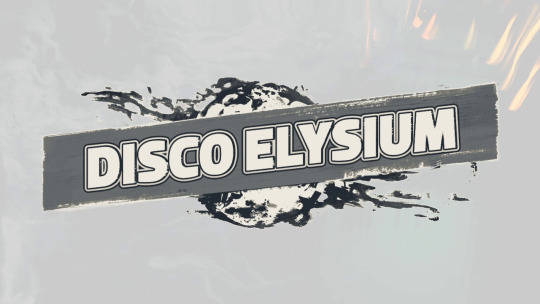
A postmodern role-playing game for a much different audience. A combination of skillful artistry and unfulfilled potential. An attempt at tackling difficult topics and pandering to different tastes. A full package, with deceptive contents...
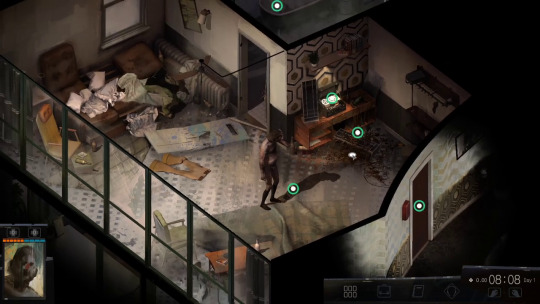
I enjoyed playing through Disco Elysium, but for completely different reasons than those that initially sold the game to me. Going in, I believed that it would be the type of RPG that I had been looking for quite some time – one that is not burdened by most of its interaction with the world happening on a grid, scanning through a list of spells and abilities, franticly pausing every frame, trying to min-max numbers as to not get destroyed by a pack of menacing farm animals of a slightly higher level. Examples of that in the genre would be classics such as Baldur’s Gate or newer re-iterations like Divinity: Original Sin and Shadowrun: Hong Kong. What I would habitually find myself doing is picking up the game, sinking my teeth into it, eventually hitting a numerical roadblock in some quest, and almost immediately retiring to a life of “not playing that game ever again”, as I am faced with the option of either save scumming and beating my head against the numeric wall, until by some fluke of the numbers I get the “good” number and am allowed to proceed; or could just stop doing whatever thing I am currently invested in and go somewhere else on the map, where the numbers are not as disagreeable, so I can get my personal numbers high enough to where the numbers I was having difficulty with before seem less impressive and I can pick up that quest again, but this time only halfway through, struggling to remember contextual cues that were relevant perhaps a few hours ago, but are now a forgotten footnote in some journal entry.
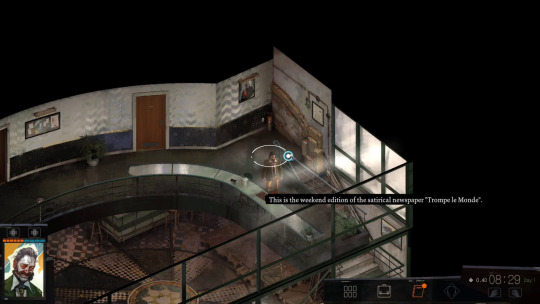
In both cases, the immersion gives way to the idea of gameplay, as the perhaps flawed ideal of an RPG is that which is based on table-top role playing games, such as Dungeons & Dragons, the aforementioned Shadowrun, or anything else that follows the same formula. From my personal experience in TTRPGs, the same issue persists, namely in having meaningful choice and character development take second fiddle to massive 3-5-man 1-2-hour combat encounters in between the more immersive moments of dialogue between players, non-player characters or story development. I’ve always felt that combat is so abstracted from everything else in TTRPGs in the way that it suddenly shifts into an entirely different game, which unlike the elements of role-play is less free-form and bound to a rigid set of rules. You’re no longer interested in how things look, feel or act, but rather how large a number is on a sheet of paper; and this contention of mine seems to always be translated into the video game counterpart of this genre, carrying the same problem from one medium to the other. Games even seem to compound upon the issue, by putting you in charge of multiple characters, where your custom created character is somehow not only equal to them, but at the same time the savior of the universe and all that is holy.
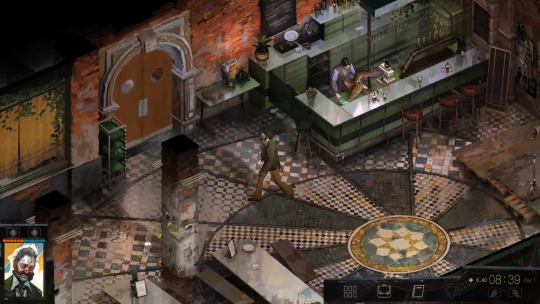
I cannot help but believe that the party ought to be AI controlled pawns, considering that they are supposedly different people with their own goals and aspirations; thus leaving the player to micro-manage their singular character – their avatar in the game world, rather than developing a form of psychogenic schizophrenia by having to deal with each and every one of the party’s members (now, admittedly the remakes of both Baldur’s Gate games have such a feature, but the combat AI is so poor, that you still have to go and remind them that they actually have a whole list of spells that they could be, in fact, using to… for instance, heal you, as you sit there bleeding profusely, crippled and powerless on the ground).
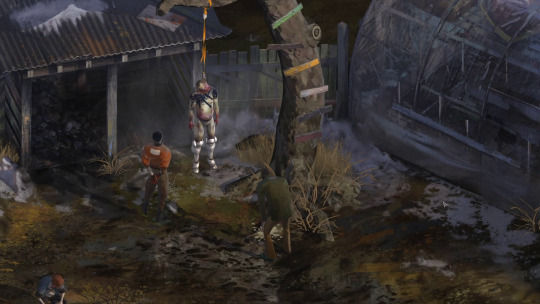
The only games which I have seen managing combat and RPG elements successfully are listed as a fundamentally different genre, known as “immersive sim” or “0451 games”. To name a few, that would be games like those of the Deus Ex, Dishonored and even the Fallout series. Most of those are first-person, for the most part shooters, with some emphasis on a singular character’s development through dialogue and stat point distribution. My main point can roughly be exemplified by comparing the naming convention and the reality for both genres: one is a “role-playing game”, the other is an “immersive simulation”; the first being used deceptively, as you could be playing a multitude of roles at any given time and also suspending that role-play to participate in some rather lengthy tactical combat for what could be 50% of the game’s runtime. On the other hand, you have “immersive sim”, which according to Warren Spector (game designer of Deus Ex and Thief fame) is a game in which “you are there, [and] nothing stands between you and [the] belief that you're in an alternate world”. I simply cannot emphasize enough how even the most engaging narrative and the most skillful writing can be tarnished by this type of abstract combat, which feels so fundamentally foreign and somehow still intrinsic to the idea of role-playing games and immersion.
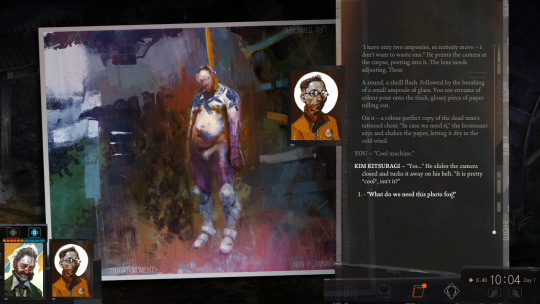
Disco Elysium seemed to be the odd one out – a RPG that has no combat, except that, initiated by your choices in dialogue (more akin to playing an animation than actual combat). It was also advertised to me as having quite an in-depth ideological system, that was affected by your choices in-game and would automatically adapt dialogue according to your flavor of politics, philosophy or culture through a series of thoughts, which you would internalize, if used often enough. Frankly, it seemed like wish fulfilment for a jaded immersion-loving straight-edge centrist such as myself.
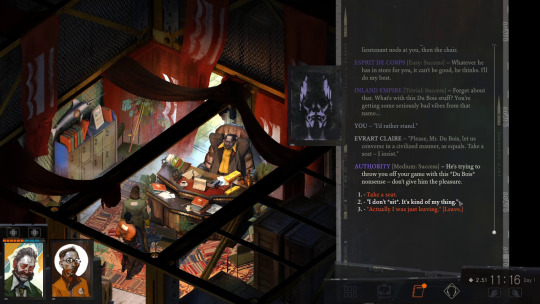
Upon launching the game, I was quickly introduced to the persona that I would be inhabiting – a deranged, drunken amnesiac, who in some cases would pass as a cop, but only if one’s notion of law-abiding is that of a drug-fueled abusive lover; also known as - the farthest thing from me. I already knew that my journey through the game would be that of a redemption arc, where this horrible piece of shit human, was going to become the most squeaky-clean, drug- and alcohol-free centrist known to all of Revachol. A true test of the game’s systems in action – from deranged and corrupt, to the straight and narrow. To my eventual surprise - I could do all of it, and very successfully at that. By the end of my nearly 24-hour playthrough, I had achieved my ideal vision for the character, with only a bit of resistance, which I will briefly mention further down the line. For now, I had succeeded in using all the tools available to me in order to internalize the thoughts for centrism, rejecting any form of drugs, and by the end almost managing to squeeze in the time to internalize being sober, cut short due to the spontaneous conclusion of the game.
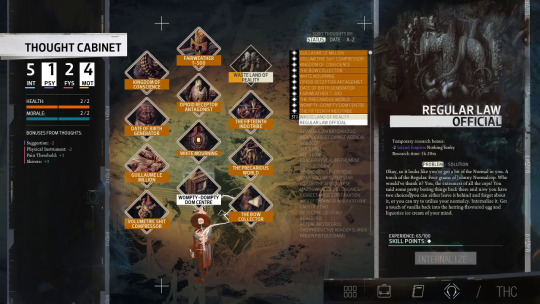
The thoughts system was not entirely what I had initially imagined. Namely, what I had envisioned was a system, which converts whatever responses one made throughout the game, into non-internalized thoughts, which would begin to alter the dialogue options available, and only after choosing to emphasize said options, would it eventually internalize and give you a lot more radical options based on said thought. What it would turn out to do instead is make the acquisition of thoughts work in a similar manner, but make the process of internalization a menu, in which you “equip” thoughts into available slots. It seems like a minor inconvenience, but it makes the thoughts feel like yet another item that you just set and forget, rather than the thoughts of a person being actively developed over time, based on what kind of discourse they engage in. I suppose the idea of having it take anywhere from thirty minutes to six hours to internalize is there to be the substitute for the drawn out process of internalization. It is in a way saying “I feel like turning into a centrist in the next thirty minutes.”, while going around doing investigative work around a crime scene. The more active process I envisioned, would indeed take a lot longer, but it would be massively more immersive, as more and more options become available to you over time, rather than after some arbitrary timer has gone down.
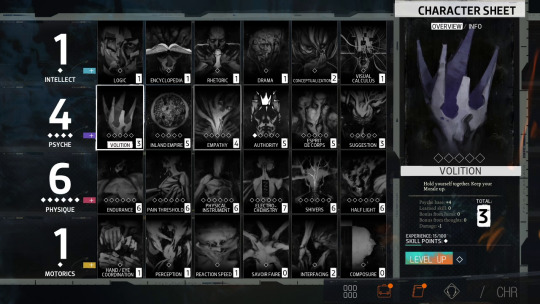
Another big detractor is having to use skill points to unlock new slots for thoughts, which would otherwise be put into your more practical skills. Theoretically, one would think a human has an almost infinite capacity for new ideas; and one is surely not going to want to internalize them all. A good example would be the “Volumetric Shit Compressor” thought you gain early into the game, which mainly fulfils its purpose in one skill check for less physically able characters as a part of a single quest and is never made use of again, beyond its flat stat bonuses. No other thought in my playthrough had a temporary pragmatic function like that, which feels like a missed opportunity. Its temporary nature is where the skill-point cost seems absurd, when they could be better used to improve one’s skills. In what way would the character becoming more skillful help them stop “getting their shit together”? Wouldn’t one discard the though immediately after it’s no longer useful? The way the system works currently, meant that I spent most of my points on slots and playing around with thoughts, rather than improving my character until the very last parts of the game, which in effect made the game more difficult than intended. The decision to make thoughts equipable and not persistent passive perks that can upgrade into more radical or complete versions of themselves is perhaps one of my main disappointments with the game. The effect on scope would be minimal, as the game already has the dialogue options for those thoughts written and would only need to change their acquisition and internalization to be less menu-driven and more player-driven.
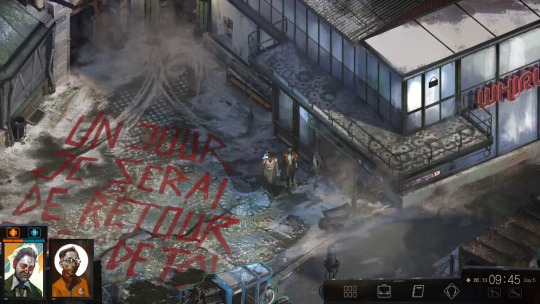
I tangentially mentioned not having skill-points to freely use until the latter parts of the game: That in turn made skill checks a lot more difficult and perilous, by making white skill checks (ones you can fail and retry upon increasing the skill they require) harder to re-unlock once failed and making red checks (ones that you cannot retry once failed) almost impossible, if not clothed in every stat-boosting piece of apparel in one’s inventory or seasoned with every potentially hazardous bottle of booze or glowing fairy dust left lying on the ground. White checks also do not unlock after one has used a consumable item or changed a piece of clothing to boost said stat, which encourages save scumming, as there is no way to change clothing in the middle of dialogue or knowing what the skill check will be, leading to one of the many pitfalls which I described earlier.
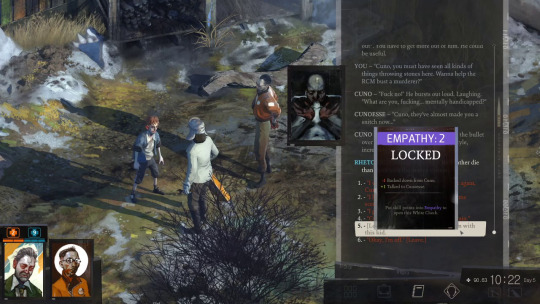
An even greater fault is that some quests just drop dead in their tracks, if the stat check is not completed. Moreover, since one cannot be proficient in all four skill categories, I would regularly hit a brick wall, upon being faced with a Psyche or Physique skill check, as my character mainly specialized in Intellect and Motorics. The thing about hitting a brick wall in Disco Elysium is not so much that you fail and have to face the consequences, but rather cannot continue at all and the narrative stops dead in its tracks until you can succeed the check. Sometimes quests are tied to each other, so not being able to progress in one of them means that you can’t progress in any of them. Suddenly an entire quest chain can just be gone at the click of a button. It got to a point where I would prefer to hear that all my efforts were in vain, fucking everything up irreversibly, rather than having a white check get locked and sit there in my journal, waiting for me to miraculously gain five points in some sub-skill of Physique. One way to fix this would be to have more obfuscated red checks with uncertain odds that lead to failure states. At least that would be more immersive than the current offering, as one could live with the consequences, rather than be left guessing what it could have been if one had slightly higher skills. This, however, could be difficult, as there is a dice roll to every skill. Not being skilled merely means you have less of a chance of succeeding or, alternatively, a higher chance to fail and lock the skill check.
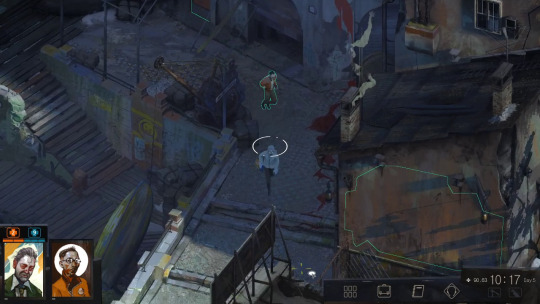
The one thing that the game does great when it comes to skills is the addition of secret tasks. If one were to follow particular lines of inquiry, they often lead to some skill check down the line becoming easier, due to the things learned beforehand about that topic. This system rewards being thorough and attentive and is, perhaps, the best feature of the game. However, observations made through the “shivers” system (where orbs of information will show up contextually above the protagonist’s head, revealing information about the environment or elaborating on something relevant) do not appear to factor into these skill checks. This often leads to you reading something important when it pops up in the overworld, but upon engaging someone in conversation one must often select benign lines of dialogue, acting like one hadn’t made those observations to begin with. The dissonance is even more infuriating whenever Kim (your companion throughout the game) tells you that you are obviously wrong, because he also made those observations but (unlike you) could talk about them. It would have been a lot more diegetic if there were dialogue options available for you to repeat the observation to Kim instead, perhaps as you talk to him in the overworld (a feature that is woefully underutilized, and shows the same five or so options throughout the entire game, except whenever Kim wants to talk to you about something he deems relevant – an ability, which you would think the player should have had as well).
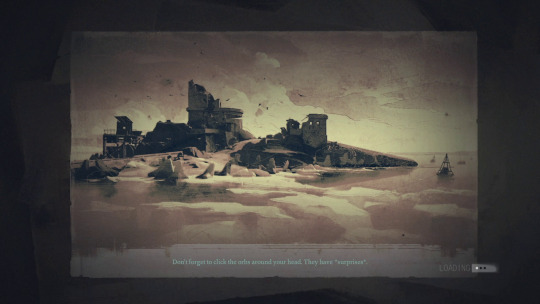
Speaking of the overworld, Disco Elysium does quite a lot with the small real-estate it has on its map. For what feels like a small neighborhood, it packs tens of hours of content, a varied cast of characters and lots of places to explore. Walking around is encouraged by the game, almost to a fault. At many points during the game Kim will remark upon your seemingly absurd ability to run around without getting tired. There even comes a point where you are injured, and are told not to run to avoid further harming yourself. After about twenty hours I realized that this was in order to signal to the player that if they run all over the place, trying to finish everything as quick as possible, they would be left with a lot of extra time at the end of the day, which would have been perhaps better spent looking into side-quests or other optional activities. However, the walk speed is woefully slow and with the amount of backtracking one needs to do, means that you will be seeing the same places plenty of times, which only tempts you even more to not waste your precious time RP-walking. The game has benches, which you can use to pass the time, but they are only available whenever Kim is not with you, which is only durring the night, meaning you can’t make any meaningful progress by resting on one, effectively making them worthless. That and the presence of time-gated tasks, means you will most likely be trying to find ways to waste your time, prompting Kim to berate you even more for straying away from the main focus of the narrative, as he often does. If you’re a fast reader, the game luckily fast-forwards time based on how many options you’ve selected, rather than real-time. This is most apparent whenever you’re save scumming and going though entire trees of dialogue you’ve already read.
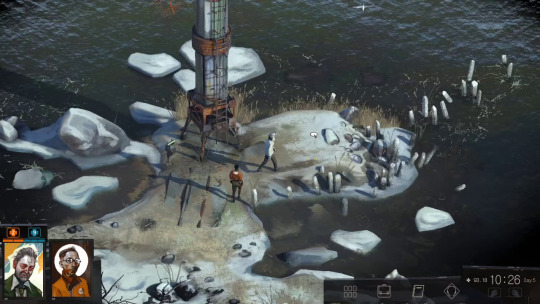
And you will be reading a lot, as this is what you signed up for when you relinquished the combat systems of your typical RPGs. A welcome change, I might add, as the dialogue is beautifully written and engaging for tens of hours. (The end credits even thank Chris Avellone for what is probably him lending a bit of his Midas touch when it comes to game writing.) However, there are of course flaws in the way Disco Elysium decides to portray some of its characters, as it is sometimes more interested in making political statements in a very one-note way that might shock some people, rather than what one would think are nuanced and fleshed out personas. A large part of the cast is wearing a thick layer of existentialism, which they seem to flaunt upon every given opportunity. The same goes for characters who clearly exhibit some variety of political radicalism; you’ve got your racist nationalist, your bourgeois-eating communist, your fence-sitting centrist (dubbed moralist) and a whole swath of colorful opinionated people whom you either interact with or endure. Everyone else is mostly pleasant to be around, if not a bit saddening, due to the overall melancholic way of life people of Disco Elysium are forced to lead, influenced by factors that they alone cannot control; an overall sense of futility present at every turn. Most of them have quirks that help them cope with their predicament, which you can explore in full detail through in-depth dialogue trees, leading to some intriguing interactions and ultimately some interesting consequences down the line. Every line of dialogue seems to have a lot of those, which is surprising for a game that so haphazardly makes you select dumb questions for answers you already know. An example of that is the one occasion in which I used a particular brand of alcohol to boost my “Pain Threshold” in order to open a certain mission-critical freezer. Which towards the end had Kim labeling me as someone who “drinks on the job”, even after becoming sober and internalizing the thought that removes all positive effects from alcohol, as well as the action leading to us retrieving an item, which we would later use to further the plot. Instead as a one-off sacrifice of one’s principles, it was seen as a major transgression that would only lead people into thinking of me as even more of a raging alcoholic, rather than someone who is trying to recover and “get their shit together”, as it were.
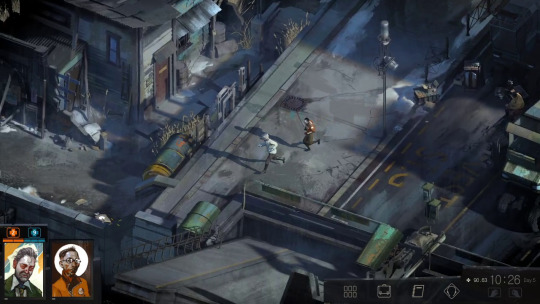
A major part of the game’s rhetoric is lost to those who do not have a dictionary that has been well tempered through copious forms of political jargon, coming from a various selection of manifestos, academic political analyses and some of the more famous philosophical works for the last century. I would go as far to say that some of the sentiments the game presents are absolutely impenetrable when it comes to wording. I’ll give you an example:
Heartache is powerful, but democracy is *subtle*. Incrementally, you begin to notice a change in the weather. When it snows, the flakes are softer when they stick to your worry-worn forehead. When it rains, the rain is warmer. Democracy is coming to the Administrative Region. The ideals of Dolorian humanism are reinstating themselves. How can they not? These are the ideals of the Coalition and the Moralist International. Those guys are signal blue. And they're not only good -- they're also powerful. What will it be like, once their nuanced plans have been realized?
If you immediately recognized that it was about centrism, then congratulations – you are a lot smarter than me and probably everyone else around you. For you Disco Elysium is the perfect college-level textual experience for your Tuesday-night 1960’s poetry club. For the rest of humanity, it’s a bunch of gibberish. Flowery prose and poetics are riddled everywhere and you're never really sure what you're doing, what thoughts you're thinking or what's happening to you.
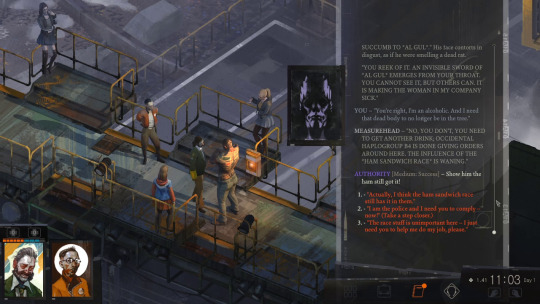
I mentioned briefly that the game tries to depict centrism as a form of moralism (a term which it prefers over the former). Even so, it presents centrism as less of an effort to hold multiple perspectives and act with a full and informed range of understanding, but rather as the stereotypical “fence-sitting” argument, where no decision can be made now, and progress can only be obtained through a slow, incremental process. While on the surface, it would seem so – as a self-proclaimed and passionate centrist, I cannot help but disagree with the outsider view that the game seems to be promoting, favoring critique of the right and an emphasis towards the left side of the political compass (making small but insignificant jabs towards both throughout). Contextually, the game’s developers Studio ZA/UM, have displayed a clear favor of the political left in their public appearances, which may explain this somewhat skewed perspective. While it’d be lovely to go on about the politics of ideology, it’s better not judge the contents of the game based on the developers’ ideological affiliation, but rather on its own merits.
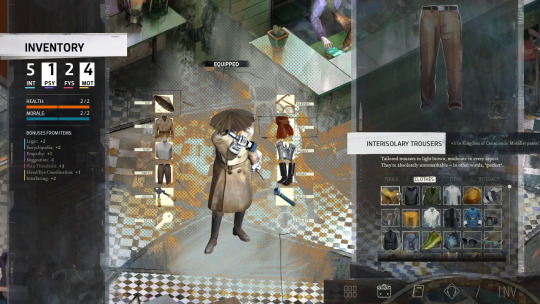
Considering the amount of reading one needs to do, I would hesitantly say that Disco Elysium is part RPG, part choose-your-own-adventure visual novel. I say RPG, because of the aforementioned brick walls, inhibiting progress in a way that no immersive sim ever would, as there would be multiple ways to get the same information, which is sadly not a thing Disco Elysium does well. The sheer volume of the text is also a cause for some, I would suppose, aesthetic concerns about the game. Graphically, the game is stunning with its unique painterly style, but it often values it over function, namely in having the UI serve little to no purpose, as Kim and your portraits take up the entire bottom left of the screen. At the same time the dialogue panel is put on the far right side of the screen, even though two thirds of it are spent zoomed in on some 3D models doing their idle animations, instead of having the text front and center, as the thing you will be most likely looking at for 90% of your time with the game. Other technical issues include shadows being displaced from where they should be, especially on stairs, as well as being incredibly jagged for a game that doesn’t really have high hardware requirements and very little real-time lighting, but all of this is frankly unintrusive, compared to the cramps in your neck from looking to your right all the time.
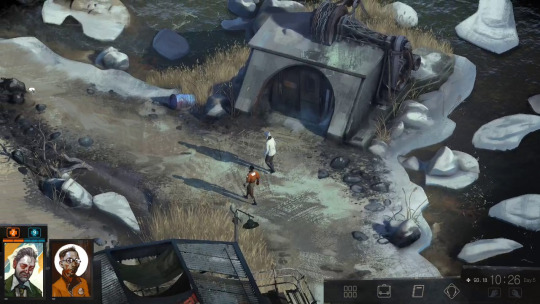
Every once in a while, you get to enjoy not having to read, as a select few scenes are entirely voice-acted by a talented cast. I am unsure, however, of the production team behind the recordings, as they seem to sound as if recorded in home studios with different microphones and sound processors. Other than that, the quality and range of the performances is wonderful, especially since it is coming from some lesser known actors in the industry.
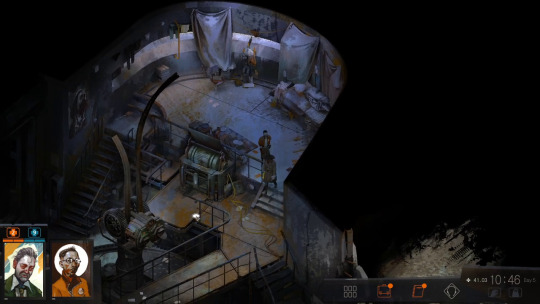
When it comes to sound, the game does a fantastic job of establishing a lot of varied soundscapes for an admittedly small plot of land. The music is ambient, droning and subtle in all the ways that make you not think about it, until you are sitting there listening to the soundtrack on your own time, remembering all the scenes that every piece of music has lifted from monotony. All of the tracks have this aging, somber tone to them, much like the world they are written for, making the music an unavoidable essential part of the experience, as you walk the fields of Revachol with the wind blowing and the small creek near you emitting a slight babble. The only downside is that the mixing of all these layers is often horribly unproportioned. Everything will be quiet, until some random intercom plays two straight minutes of loud white noise into your ear. Those parts are few and far between, but still leave a surprisingly large impression for an otherwise spotless execution of foley and ambience.

Overall, Disco Elysium is a full package. While not necessarily the game that I hoped it would be, it was still an enjoyable experience with an incredible main quest, memorable characters and side quests, elevated by wonderful sound design and fantastic ambient music, with writing that will be unparalleled for years to come. While it is not without its flaws, and some of them are quite major - it does what it set out to do with flying colors and is sure to appeal to a lot of people, who have been looking for an experience such as this. For me, however, it also represents a lot of squandered potential. It is by no means an ideal game – far from it; but I would still recommend you play through it for yourself, just to see where it takes you. It has a way of challenging you intellectually, that not a lot of games can pull off, especially nowadays. It is an admirable endeavor in tackling difficult topics, whilst also spinning an intriguing narrative that keeps you invested until the very end.
Score: 7/10
#game review#review#disco#elysium#disco elysium#harry du bois#kim kitsuragi#game analysis#game design#narrative#analysis#essay#revachol#oranje#politics#thoughts#systems#mechanics#game mechanics#RPG#visual novel#immersive sim#TTRPG#singleplayer#adventure#spoiler free#no spoilers
8 notes
·
View notes
Text
Every Homestuck Character worth mentioning’s Arc in Chuubo’s Marvelous Wish-Granting Engine
Over two hours, I have determined the (Generally Miraculous) arc of every character in Homestuck, as well as occasionally a few major build details.
Beta Kids
June Egbert: Mystic, dealing with a higher power/ideal, get told what do a lot, Immortal (Primordial) means you embody your element (Wind) and Principle (Freedom).
Dave: Frantic Knight (Become Somebody), you have a role you want to fill and a failing that stops you from reaching it. You can see your failing in others, adapt to various situations, define people in relation to you, and influence people.
Jade: Immortal Bindings (Gatekeeper), you're an intermediary between humanity and a powerful "Other", have a tendency to trust said Other, tell it what to do, call upon it for power, open doors between spaces, and produce great effects through working with it.
Rose: Immortal Storyteller (Creature of the Light), you're lost in the world for a bit, you're infected by something higher than the world and can inspire others, attract attention, and have some narrative powers.
Alpha Kids
Dirk: Sickly Emptiness (Accursed), you're corrupt or sick in some way, with something that hurts in some way you can never quite heal, and you can destroy things real good.
Roxy: Frantic Aspect (The Ace), you're trying to improve as a person but have a flaw that gets in the way. You're just generally good at mundane things, like science, hacking, and fist kind. Void powers are probably a Magical Skill like Voidy Magic with the Matriorb being a Quest Miracle.
Jane: Sickly Bindings (Wounded Angel), you're dealing with something terrible and wicked, and have that kind of thing inside you. At low levels, you can take things into yourself to give yourself powers, though it also gives an unhealing wound, and at high levels, you can receive a societal position instead of a power through the same process and save people from things such as death.
Jake: Sickly Knight (Star Power), you have a role you want to fill and a failing that stops you from reaching it. You see things in narrative terms and force the world to see you as the center of the mythos, the Exuberant Action Hero.
Post-Scratch Trolls
Vriska: Sickly Storyteller (Creature of Delirium), in which you become a story. She has an experience that she's always feeling and can steal from people. The Experience probably being relevance/certainty. It also lets you control people you stole your experience from.
Terezi: Frantic Mystic (Prophet), dealing with a higher power/ideal, around the middle of your arc you're kind of a mess without anchors. You're empowered by your principle and get visions from it.
Karkat: Frantic Knight (Become Somebody), dealing with much the same issues as his canon boyfriend, though substituting “Leader” for “Hero.”
Kanaya: Immortal Emptiness (Indomitable), “cursed” with being an immortal, nigh unkillable Rainbow Drinker
Equius: Immortal Mystic (Primordial) because it's the same powerset as June and I cannot care less.
Aradia: Sickly Shepard (Impresario), you guide and protect people, you've created yourself in some way, have a lot of thematic minions, and tell people what to do.
Nepeta: Frantic Shepard (Sentimental), shipping, empowering that what you love.
Sollux: Frantic Mystic (Shepard), he is overwhelmed by his principle of Doom, but works miracles and omens through it. Tavros: Become somebody, I guess.Eridan: Accursed, maybe, probably. Feferi: Gatekeeper, a diplomat for the horror terrors. Gamzee: Sickly Otherworldly (Called Away), being spiritual in some way, with your powers being based around rejecting reality and substituting a world of the estate you serve.
Pre Scratch Trolls
Aranea: Sickly Shepard (Impressario), a corrupt guiding figure, with focus on the Arc 5 power "Here's Who You Are", which lets you force out someone's true self, or what you think is their true self.
HIC/Meenah: Liminal Emptiness (Alluring), notable for being available as both a mortal and a Miraculous Being. It gives a lot of free points in a Superior Skill (Trollness), a Magical Skill (Psionics), gives you a bond that represents a position of power, and lets you develop advanced techniques for a few skills and tempt/influence people.
Damara: Sickly Bindings (Wounded Angel), taken in the worst direction manageable.
The Sufferer: Liminal Shepard (Gifted), which focuses on being a powerful magician, or in this case, seer, while being on the borderline between mundane and miraculous. In this case, his empowered magical skill is some form of Blood Magic. Note that Kankri lacks this because like most of the other Pre Scratch trolls, he doesn’t have much of an arc or importance, nor much use of powers that wouldn’t be at best mundane.
Cherubim
Caliborn: Sickly Knight (Star Power), in his pursuit of advancing his mythos as the ultimate “Alpha Male/Demiurge”, he becomes able to create laws of his own existence and enforce them, defining others in relation to said narrative.
Calliope: Immortal Storyteller (Creature of the Light), with her ability to appear when needed, inspire others to do great things, and alter the world to your whims.
Lord English: Does not have an arc so much as he mugs his respective components. They're all at 3, which tends towards being the peak of stress for the arcs involved.
Alt! Calliope: A Keeper of Gardens (Immortal Shepard), guiding and protecting others, you rule a certain area with incredible skill, and Indomitable (Immortal Emptiness), you bear a great and terrible curse, have inhuman abilities, and at your peak can create tools that can theoretically accomplish anything, such as the black hole that can kill Lord English. Both are at 5, the apex of your power at which the greatest powers are unleashed.
Carpacians
Wayward Vegabond: Become somebody, as the leader of the revolution.
Jack Noir: Indomitable, inhuman power and a sickness/corruption in the form of constant murder.
Parcel Mistress: Allegory (Immortal Knight): She has a role she fills spectacularly, her failing is her virtue of her sense of duty, she's involved in major events, she has a legendary weapon, and has a method of transport.
Mortals
Dad: Shepard (Dad). Possesses Superior Mangrit 4.
Bro: Aspect (Fighter), at Arc 5 with every single perk and skill being invested into improving combat capabilities. He is under the effect of Lord English’s inevitability entanglement, bringing him into the mythos of the abusive patriarch.
Mom: Shepard (Mom). Has a magical skill at 4.
Pa: Knight (Adventurer). Fucking Dead.
Alpha!John: Knight (Comedian)
Alpha!Dave: Knight (Filmmaker)
Alpha!Rose: Storyteller (Author)
Alpha!Jade: Shepard (Businesswoman)
Other
The Felt are a perk on Lord Englishes part that emulate the Impressario’s “Minion” power.
The MSPA Reader: Mystic, Sickly (Awakening), it turns out that you’re in the story. You, personally.
Chixie Roixmr: Knight, Sickly (Star Power), she deserves cool miraculous powers.
Sprites: Their composite parts, likely at a somewhat reduced level due to dilution.
#chuubo's marvelous wish-granting engine#homestuck#June Egbert#Dave Strider#Jade Harley#Rose Lalonde#Dirk Strider#Roxy Lalonde#Jane Crocker#Jake English#Terezi Pyrope#Caliborn#Calliope#Lord English#Vriska Serket#nepeta leijon#chixie roixmr#aradia megido
52 notes
·
View notes
Note
hi im the anon ! i dont remember what i said >
and I’m alarmed by the fandom mentality. Maybe HT means good - but how would we know? we don’t have access to his thoughts - but we must judge his actions, and his actions are for the least very troubling. It’s always abt coercing Mo and not respecting his boundaries. I see the trope “when she says no, she means yes” here and once again, the fact the fandom swallows it uncritically (bc HT is a poor, hot tortured boy) is alarming. Forcing Mo to wear his gift stinks of “this is my possession, don’t mess wt him” 2/5
Maybe im pessimistic n its actually to protect him by distance, but once again he totally disregards Mo’s will. What if he doesnt want to be protected ? what if he doesnt want to be an object to be pass around between self-entitled psychos ? The first step to protect and help someone is by listening to them. I hope Mo will react strongly and will tell HT that by saying this, he’s no different from She Li. And i hope that would provoke HT to self-reflect a lot - smth he lacks tremendously. 3/5
That being said i love HT and tianshan! And what i love is how realistic and flawed they are. Theyre both hyper violent, distrustful, and severly lacking in communication skills. Im thrilled to see how theyre going to evolve -for the better or the worse, both is good for me. But i’m very disappointed by the fandom reaction like “ooh how cute hes possessive it means love!” or “actually its not bad doing HT doing that bc his intentions are good”. 4/5
And I will be vry, vry disappointed if OX decides to follow this trend and to not show how this kind of actions is detrimental to their reliationship and use the tired and dangerous trope of “being violent means that you care”. I trust them to be more nuanced than that bc until now they are great at drawing grey relationship. So yea i hope next chapter, tianshan plunges (before being better). Anw sry for the rant, and plz continue the good work !! 5/5
phew. there’s a lot to unpack here – but I agree wholeheartedly with you. since this post is already kinda long, I will put my answer/explanation under the cut!
the parts that I bolded in your asks are what I intend to focus on in this answer. strap in, because this is going to be a long one.
before anything, let me put a disclaimer: I love He Tian. I love Guan Shan. I love Old Xian. I love tianshan, and I love where they are headed in the manhua. does that mean I also love where tianshan are right now? no, it doesn’t. and I’m here to explain why I look forward to their potential rather than their current relationship’s dynamics.
one of the hardest parts about being in a fandom is being able to separate fiction, reality, and morality. this is especially hard when a fandom is as old and endearing as 19 Days, and when you fall in love with & are rooting for all the characters. furthermore, 19 Days is not a tragedy. of course, when Jian Yi disappears, it will be tragic. but otherwise the majority of the manhua is a comical, romantic slice-of-life plot. as such, it’s easier for what would usually be seen as blaring issues/problems in tragedies to be disregarded for comedy or, in some cases, romance in a comedic, romantic slice-of-life.
this is exactly the case with tianshan. I’ve said it before and I’ll say it again: He Tian’s current relationship with Guan Shan is not healthy. he doesn’t listen to Guan Shan. he doesn’t respect his personal space. he doesn’t know where to draw the line. he doesn’t know how to properly communicate with him, and thus resorts to violence or threats. tianshan just have a problem with communication. and, sure, maybe it can be chalked up to the fact that they’re young and stressed and don’t know any better. but that excuse is almost as bad as the “boys will be boys” excuse, and that doesn’t make it any better nor does it justify their actions.
He Tian’s idea of relationships is so twisted, and as I talked about in a previous answer, it can probably be stemmed back to his trauma with the puppy Cheng took away from him. I won’t get too deep into that since I explained it in detail in that answer, but keep this in mind nonetheless: He Tian grew up in a family of violence, distance, miscommunication, and lies. it’s all he’s ever known, and that’s what he’s applying to his relationship with Guan Shan. does that make it right? no, absolutely not. but he’s learning.
when Guan Shan had a panic attack at the restaurant, He Tian learned that people aren’t robots/pawns to use at his disposal and rather have their own strong emotions/backgrounds that shape them. thus, he brought Guan Shan home without a word. when he had his night terror and woke up to Guan Shan holding his hands, He Tian realized that there are parts of Guan Shan he still doesn’t know and, potentially, an aspect of their relationship that they’ve only started to uncover. thus, he thanked him without preamble and with a bowed head.
what I’m trying to say is that He Tian does have good intentions at times, but not always. he’s learning as he goes, because god knows he didn’t have a family to teach him how healthy relationships should be. there probably is a part of He Tian that only wants to protect Guan Shan against She Li, but he certainly doesn’t show it in the right way. he acts possessive because he knows that if he doesn’t, he’ll lose what he loves (*insert flashback to the puppy*). again, does that make it right? hell no. jealousy and possessiveness are not cute and are entirely unhealthy in a relationship. the fandom should view them as such, but should also keep an open mind when considering He Tian’s background.
and honestly, the reason why I’m focusing so much on He Tian right now rather than Guan Shan is because if it were up to Guan Shan, he would’ve dropped He Tian within the first few days (maybe even hours) of meeting him. but because of He Tian’s persistence, Guan Shan has no choice but to be involved with him and retaliate when He Tian verbally/physically/emotionally attacks him. nonetheless, Guan Shan has tried to walk away from He Tian on multiple occasions when He Tian’s teasing became too much, and on those occasions, He Tian has given in. (ex. I can’t find the exact chapter, but there is a chapter in which Guan Shan refuses to use He Tian’s fork to eat He Tian’s leftovers, and he gets up and says, “I’m going home,” to which He Tian replies, “Fine, fine, I’ll buy you new food.”)
so yes – tianshan certainly have flaws. He Tian holds too much power, and Guan Shan can’t catch a break. the fandom romanticizes their interactions, but if you take a moment to think realistically and recognize that character flaws are essentially bad but also critical for character development, then there is an even balance in the readers’ relationship with the manhua. don’t support He Tian’s violent interactions with Guan Shan and claim “omg He Tian loves Guan Shan sooooo much when he forces Guan Shan to do XYZ,” but rather support the fact that he hasn’t physically manhandled/harmed Guan Shan in many chapters. support and celebrate He Tian’s development, not his flaws.
and as for what you said about Guan Shan telling He Tian that he’s “no better than She Li”? while I don’t think He Tian is truly as bad as She Li, I actually think that would be a painful, great, and pivotal moment in their relationship. after all, the most consequential scene in tianshan’s relationship thus far has been the kiss. at that moment, Guan Shan had told He Tian outright that he disgusted him and to leave him alone. since then, I don’t think He Tian has ever looked so… taken aback. unsettled.
and guess what? their relationship has only gotten better since then, and He Tian hasn’t touched him like that again.
I don’t know, anon. it’s a tough call. I think tianshan have a lot more chapters ahead of them, and I don’t think Old Xian will allow them to end on bad terms. actually, I don’t think Old Xian will allow them to end on the terms that they’re on right now. they can only improve from here on out, but how Old Xian will go about showing that improvement is unknown to us. there are many paths this story can take, but rather than worrying about what might happen, let’s focus on the here and now. let’s focus on the problems at hand, and let’s focus on the development the characters are undergoing.
don’t ignore the wrongness/cruelty of characters’ actions, but don’t romanticize them either. if you do, you’re only doing a disservice to the character’s personality, existence, and the author’s intentions.
(and as for this newest chapter specifically: I see why people can get excited about He Tian telling Guan Shan to wear the earrings. He Tian wants to verify to both himself and She Li that Guan Shan is with him now. that Guan Shan is no longer under She Li’s control. who doesn’t love a little verification of their OTP’s relationship, especially when it involves an enemy?
but at the same time, it’s unhealthy. Guan Shan doesn’t have a say. he’s being handed around like an object. I don’t think this is pessimistic thinking; I think it’s the truth that no one wants to acknowledge/hear. but I’m not saying that tianshan is wrong in this chapter; I’m saying that He Tian has good intentions, but he’s not showing them correctly. and there will be a chapter in which he does show them correctly, but we must travel this rocky road before we get to that point. patience is key, and I cannot wait until He Tian and Guan Shan reach that moment of clarity. you can’t have light without the dark.)
24 notes
·
View notes
Text
No One’s Character Is Getting Flanderized
Frankly, to bring up the argument that an author is mischaracterizing their own characters is a hefty one- unlike certain elements of plot and setting, which usually can be fact checked or analyzed as flowing naturally from one event to the next, characterization is something that has a slight element of surprise- the surprise being, characters can act or present themselves in certain ways that don’t make sense until something later on comes up that expands upon the characterization. Generally, authors have their own plans for how a character is going to be that we aren’t privy to- to argue for inconsistent characterization means to prove the disconnect between how a character is before and after a certain point, or if the change is more gradual, why that progression isn’t natural.
The argument seems to be that the progression of Koito’s character in Golden Kamuy is unnatural- that he doesn’t seem to be the same character after a certain point in time.
I would be a little more understanding if the mischaracterization was taken to a great extreme, but that just simply isn’t the case in Golden Kamuy.
This little meta is, of course, in regards to the Karafuto Arc. It could be argued that characters such as Koito and Tsukishima are deviating too heavily from their original portrayal, but the way I see it, to say that is to overlook a fair bit of nuance.
Perhaps my biggest issue with the initial meta brought up is the idea that two identities cannot exist in the same person simultaneously. There’s an assertion that Koito is incredibly competent in the chapters before Abashiri, but is portrayed as more of a rich, spoiled brat after- and in some ways, that is true! Koito is, as a character, an extremely competent fighter and isn’t at all afraid to do what needs to be done, whether that be murder or fighting on an airship. He’s quick thinking- he finds out the man who’s pretending to be Inodou is an impostor within the span of a few sentences, for instance. After Abashiri, there are a lot of jokes made about his inexperience.
The fact of the matter is, though, is that someone can be a rich, spoiled brat and still be incredibly competent at the same time. In fact, I’d even say that his competence is still on display, in many ways, during the Karafuto arc, and to ignore them is to reduce his character post-Abashiri down to a joke. Take for instance, the circus arc.
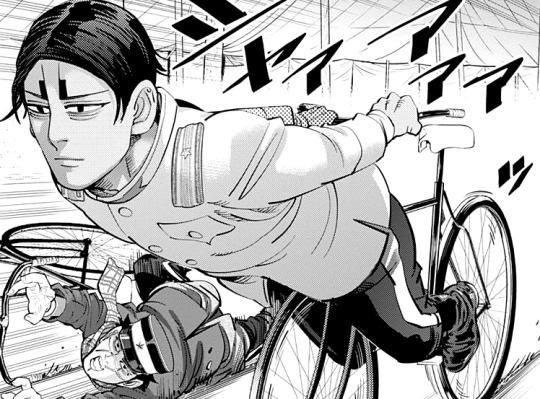
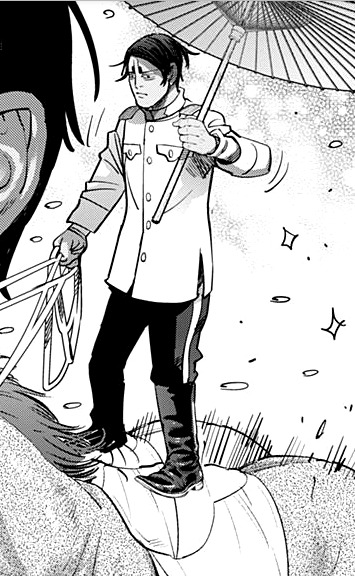
Behold! Incompetence.
This arc, for all it’s flaws (and I will admit, circus arc was certainly one of the weaker arcs that Noda has put forward so far) also yields some of the best of Koito- before the entire fiasco with the photograph, at least. It even holds one of my favorite Koito lines to date, when he speaks to Sugimoto about his act.
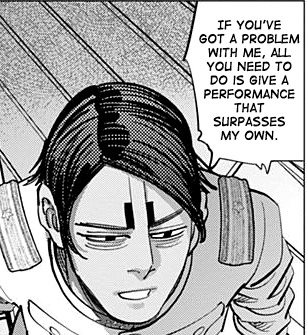
While it’s true that it might have been easier for Koito to half ass his own performance, and likely damage some of the goodwill he and the others have with the Yamada Troupe, he gives this line instead- and while it may be parsed in a somewhat arrogant way, there’s no denying that Koito has good intentions with this line. He shows a clear understanding that to make an act work, you have to live and breathe it- it’s one of the rules of acting proper. Take it from someone who’s had some experience acting.
During the stenka arc, the story is much the same- while there are moments he looks to others (like when Sugimoto goes absolutely berserk), he’s still fairly useful. He participates in the stenka and fights extremely well, interrogates the owner of the bar effectively and efficiently- and the plot moves forward.
Another little place that looked a lot like “incompetence” in the Karafuto Arc that was played off a bit as a joke was Koito in the lighthouse- namely, he stands in front of the light and Tsukishima warns him that he’ll block out the light. However, it’s that very same flickering that signals to Sugimoto and Tanigaki that the light isn’t from the moon, and helps bring them back. While it’s not stated directly, this seems like quite a deliberate action.
Then, to scale it back to Before Abashiri- Koito is, essentially, still a spoiled brat back then. It’s just that due to his role in the plot at the time, it was supposed to be something that was read between the lines- here’s Koito, the son of a well respected military officer who is able to entrust him directly to Tsurumi. Excelled in the military academy, with a perfectionist streak- likely due to an educated upbringing. Even the mere fact that he has no qualms about warfare or the value of human life is a pretty good indicator that there’s a strong disconnect between himself and most people.
The thing that bothers me most about the idea of Koito being “”radically”” different during the Karafuto arc is because, honestly, Karafuto arc and pre-Abashiri are very different environments. Not only setting-wise, but narratively.
Pre-Abashiri: The 7th Division has more action scenes and more scenes wherein the members are doing something plot important. Koito has less character building scenes pre-Abashiri than the other members, like Tsukishima and Nikaidou. The setting is, generally, indoors, or in places where Koito expects to be. Tsurumi and Tsukishima act as an anchor of sorts.
Karafuto: While Sugimoto’s gang is searching for Asirpa, there aren’t really as many action scenes. Their biggest enemy appears in the circus arc and stenka, and then from then on out it’s just the elements they have to contend with. Koito doesn’t expect anything, and is severely out of his element. Koito tries to anchor himself first to Sugimoto (”he has a plan, right? right?!?!”) and then to Tsukishima, who is slightly out of his element as well, but not as much as Koito.
In a lot of ways, it’s like comparing apples to crabapples- still fruit, still an apple, but different flavors. Before Abashiri, Koito showed more of his competent side because more scenes allowed him to do so- during Karafuto, his inexperienced side is on display, because being out in the wilderness for an extended period of time isn’t what he’s used to.
It’s said that the different environments and circumstances don’t excuse the shift because other characters treat Koito in a mean-spirited way. While it’s true that they can be a little mean at times, it’s certainly nothing that’s out of place in the manga- just look at the early chapters and how Sugimoto and Asirpa “joke” with Shiraishi. And last I checked, whenever Shiraishi got bit by an animal or did something stupid, he usually also got hit upside the head. A lot of the more “mean-spirited” jokes are directed at the victim only when they do something stupid, or else Koito had done something mean spirited in turn (like making fun of Ogata for being a prostitute’s kid- harsh much?)
So what’s the long-term ramifications for what I’ve discussed thus far?
I believe that Karafuto arc is going a long way towards Koito receiving a character arc. Once he and the rest get to Akou Prison, it’s likely we’ll see Koito getting right back into the fray and fighting with that characteristic skill of his, and as he has more experience in the wilderness the jokes at his expense will be less. It may also go into the fact that Koito depends a little too much on others for guidance- especially Tsurumi- and that he needs to work towards reaching his goals without the crutch of someone else giving him a goal to aspire to.
More importantly, though, I do believe he’ll become a better person. People just need to take it easy and let Noda’s story flow- whether or not it’s planned beforehand is, honestly, irrelevant. Some writing styles work better with it planned, some work better when there’s character driven interactions driving the plot, and I believe that Noda, at the very least, knows what his plan is for the characters.
It remains to be seen what that means for the story overall.
EDIT: expanded a bit on the point of it being “arrogant”, because it isn’t arrogant to criticize a piece of media- however, I still stand by all my earlier points that Koito’s characterization in the Karafuto Arc is a natural outgrowth from his characterization pre-Abashiri
#golden kamuy#golden kamui#koito otonoshin#character meta#karafuto arc#calm thyselves the arc isnt over yet#theres still a lot to see#and nuance to take into account#anyway shrug
15 notes
·
View notes